The competitiveness of a social Europe
Opinion piece by CESI Secretary General Klaus Heeger


All Posts
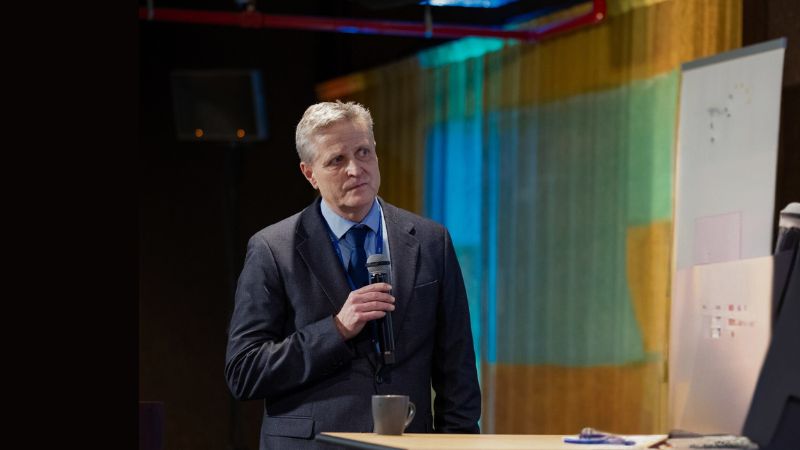

The competitiveness of a social Europe
Opinion piece by CESI Secretary General Klaus Heeger
The EU’s focus is, rightfully, shifting towards competitiveness (and security). Mario Draghi, the former European Central Bank chief and Italian Prime Minister, wrote in his 2024 report on EU competitiveness: “Without action, the EU risks a ‘slow agony’ of declining competitiveness.”
When EU leaders gathered in a ‘retreat’ in Belgium yesterday (in the presence of Mr Draghi), the question was therefore not whether Europe should pursue competitiveness — it must. The question was which model of competitiveness it should pursue.
For decades, Europe has stood for a model that favoured shared prosperity and general well-being over the mere pursuit of individual wealth. Yet it now appears sluggish in many respects: overregulated, ageing, and not sufficiently innovative. In terms of competitiveness and productivity, it seems to be falling behind key global competitors.
At their informal meeting, EU leaders agreed to further simplify EU rules, deepen the Single Market, ease regulatory frameworks for businesses, promote investment, protect strategic industries and foster global free trade.
The urgency to act is real — and so are the familiar reflexes that tend to follow in such moments.
Fostering competitiveness has often come at the price of deregulation and the dismantling of the welfare state. History has seen many phases in which internal devaluation, fiscal contraction, social spending cuts and public-sector retrenchment were presented as unavoidable paths to restoring economic strength.
Yet this often resulted in social fragmentation, impoverishment, weakened public services and, not least, political instability — quite the opposite of what underpins Europe’s traditional model of broad-based well-being.
Alongside the conviction that competitiveness can best be achieved through deregulation and the dismantling of social protection, another belief has taken hold: the belief that technological progress alone will deliver growth and shared prosperity.
From Silicon Valley to Davos, the global debate on competitiveness is increasingly shaped by a powerful technological optimism — the assumption that innovation and artificial intelligence will generate jobs, growth and prosperity almost automatically.
At the 2026 World Economic Forum, Elon Musk claimed that robotics and AI will lead to a future of “abundance” (of jobs, opportunities and services); and according to NVIDIA’s CEO, Jensen Huang, AI infrastructure will create new jobs across sectors, helping address, for instance, healthcare workforce shortages.
Yet economic history can teach us otherwise. The so-called ‘Engels’ Pause’ (a term coined by the economic historian Robert C. Allen in reference to the German philosopher Friedrich Engels) suggests that technological progress and productivity increases do not necessarily — and certainly not immediately — lead to improvements in human well-being.
Friedrich Engels observed in early industrial Britain that industrialisation massively increased output and profits, but that workers’ living standards stagnated or worsened for decades. The gains were captured first by capital owners, not labour. That shift came much later.
One could argue that we are in a new ‘Engels’ Pause’: AI and digital technologies boost profits and market capitalisations, wages lag behind productivity, job security erodes, and wealth concentrates. Seen through this lens, “abundance” narratives can sound like: “trust us — the benefits will trickle down. Eventually”.
Yes, technological progress creates the capacity for abundance; but institutions determine whether that abundance is shared — or concentrated.
This is why Europe’s model matters.
CESI’s EU co-funded project ‘SynCrisis’ showed that competitiveness can be achieved only when social policy is part of the strategy. Periods of strong public investment — notably during the suspension of fiscal rules during and after Covid-19, and the launch of NextGenerationEU — coincided with improvements in debt-to-GDP ratios and a recovery momentum.
The project’s findings also show that countries with stronger social protection systems often rank higher in competitiveness indices. This is not accidental. Social investment strengthens human capital, stabilises demand, and enhances institutional trust — all decisive factors for long-term productivity.
In 2025, CESI’s Presidium emphasised that sustainable competitiveness depends on strong public services and social dialogue. Acknowledging the growing role, importance and benefits of AI and ICT, it stressed that technology should not become synonymous with deregulation and social cuts — nor a pathway to them.
These are not arguments for slowing down reforms, innovation and competitiveness efforts. They are arguments for ensuring that these efforts remain guided by social stability and investment in people.
As the Draghi Report underlined, promoting competitiveness should not lead to wage repression to lower relative costs. Draghi stressed that the skills and knowledge of the workforce are an important competitive factor. “Without such human capital at the centre,” he said, “Europe risks declining growth in the face of global rivals”.
Sustainable competitiveness is not about deregulation and social cuts. It is about promoting innovation, and investing in people, infrastructure, innovation and strong public institutions. It is about skills and lifelong learning, fair labour standards, robust social dialogue — and ensuring that technological progress benefits the many, not just the few.
Technological progress and industrial innovation could unlock unprecedented prosperity. But, as Engels observed in the 19th century, early industrial growth did not automatically improve workers’ lives. It took institutions, collective bargaining and political struggles to translate productivity gains into shared welfare.
Today, Europe stands at a similar crossroads. Abundance is possible — for the many — but only if Europe chooses a model that strengthens its social foundations rather than weakens them.
Opinion piece by CESI Secretary General Klaus Heeger


New position on affordable housing
CESI Youth has adopted a new position on the recently published European Affordable Housing Plan.
The position on the new European Affordable Housing Plan puts down implementation priorities from the perspective of young workers across Europe. It stresses, most notably, the need of :
- Reprioritising social and affordable housing in investment policies, recognising that decades of underinvestment have reduced public housing stocks, pushed more people into overpriced private rentals and deepened social divides.
- Mobilising EU-level financial instruments more strategically to encouraging more innovative financing of affordable housing.
- Seeking a seek a shift from short-term housing allowances that can inflate rents towards supply-side solutions by, for instance: Building, acquiring and renovating high-quality,energy-efficient social and affordable homes; curbing the ‘touristification’ of housing through primary-residence rules and mandatory registration for short-termrentals; improving occupancy and to tackle long-term vacancies and empty homes by using taxation tools; and better using of existing housing stocks (‘quiet’ supply) by supporting small-scaledensification housing.
- Using EU economic, social and labour policy coordination more strategically to strengthen housing affordability, as affordable housing is inseparable from fair wages, secure employment and strong public services, all of which the EU can strategically support.
- Combating homelessness and housing exclusion by supporting adoption of a ‘Housing First’ model across Member States.
- Strengthening tenant protection through support longer default leases, predictable and index-linked rent increases with hardship safeguards, limits on unfair evictions, faster mediation and tribunals, and minimum quality and energy standards paired with renovation support so costs are not pushed onto renters.
- Using remote and hybrid work to reduce housing pressure on the most expensive city centres.
CESI Youth Representative Antonello Pietrangeli said: "As CESI Youth, we welcome the European Commission’s European Affordable Housing Plan as the first structured EU-wide effort to treat housing affordability and availability as a social crisis and a barrier to mobility, opportunity and Europe’s competitiveness. Housing is a human right, recognised in the UN's Universal Declaration of Human Rights, and a foundation of dignity and equal opportunities in the European Pillar of Social Rights. As such, housing must be treated as a public good, not merely as a market commodity. Affordable, inclusive, and sustainable housing is essential to ensure dignity and equal opportunities for all, and young people especially."
The full position is available here.
CESI Youth has adopted a new position on the recently published European Affordable Housing Plan.


Building future-ready civil protection workplaces in Athens
At CESI’s eQualPRO event in Athens, stakeholders exchanged on how digitalisation and artificial intelligence are transforming civil protection services and how social dialogue can help ensure fair, inclusive and future-ready workplaces.
CESI, together with EPAYPS, organised the eQualPRO National Sectoral Conference on Civil Protection on Friday, 23 January 2026, held in Athens and online. The conference explored how artificial intelligence and digital transformation are reshaping civil protection services—and how social dialogue can ensure these changes support equality at work, ethical governance, and fair career opportunities for everyone.
The agenda opened by framing the European dimension of social dialogue and equality at work, positioning AI as both a potential lever for progress and a risk if deployed without safeguards. Discussions highlighted the need to anticipate gendered impacts of new technologies and to strengthen inclusive approaches as digital tools become embedded in public services.
Key conference sessions addressed:
- AI and civil protection policy direction, including public safety objectives, ethics and accountability, and the importance of risk-based adoption of AI systems.
- EU equality policies at work, looking at practical implications for workplaces—such as work–life balance, women’s participation and leadership, and how equality goals can be translated into day-to-day employment realities.
A dedicated panel discussion focused on what it takes to build AI-enabled civil protection services while ensuring workplaces remain fair and sustainable. The debate centred on:
- Governance: rules, oversight and integrity mechanisms to ensure trust and accountability;
- Skills: preparing workers for new tools and roles through training and lifelong learning;
- Social dialogue: involving workers and their representatives in technology-related decisions;
- Fair career progression: preventing new forms of bias and ensuring equal access to development and advancement in the AI era.
The conference closed with key takeaways and follow-up orientations, reinforcing eQualPRO’s objective: to support social partner-driven solutions so that digital transformation in public services strengthens equal opportunities, improves working conditions, and enhances the quality and resilience of civil protection systems.
At CESI’s eQualPRO event in Athens, stakeholders exchanged on how digitalisation and artificial intelligence are transforming civil protection services and how social dialogue can help ensure fair, inclusive and future-ready workplaces.


EU Quality Jobs Act must bring tangible improvements for workers
As the European Commission consults on the scope and direction of a new EU Quality Jobs Act, CESI stresses that new measures must bring tangible improvements for workers in Europe, reconciling decent jobs with boosted competitiveness of firms.
It its contribution to a first phase EU social partner consultation for the European Commission, CESI welcomes the initaitive for a new EU Quality Jobs Act as a necessary step to ensure that Europe’s economic transformation, competitiveness and strategic autonomy are underpinned by high-quality employment, fair working conditions and strong workers’ rights.
According to CESI, the Quality Jobs Act must serve as a further implementation tool of the European Pillar of Social Rights and translate the commitments of the Quality Jobs Roadmap into concrete, enforceable and measurable EU action that deliver tangible protection and improvements for workers across Europe. The Act must move beyond coordination and guidance and provide a robust framework combining legislation, enforcement, soft law tools, social dialogue, and investment.
CESI Secretary General Klaus Heeger said: "Quality jobs are not only a social objective but also a key economic driver: They foster productivity, innovation, resilience and trust,while preventing labour shortages, in-work poverty and social dumping. Only byplacing quality jobs at the heart of Europe’s economic strategy can the EU ensure sustainable competitiveness, social cohesion and trust in the European project."
The full contribution with CESI's detailed demands towards a new EU Quality Jobs Act is available here.
As the European Commission consults on the scope and direction of a new EU Quality Jobs Act, CESI stresses that new measures must bring tangible improvements for workers in Europe, reconciling decent jobs with boosted competitiveness of firms.


CESI Youth at Euronews debate on China-Europe Youth Exchange and Dialogue
Today, CESI Youth spoke at a Euronews debate on ‘Building the Future Together: China-Europe Youth Exchange and Dialogue’.
Organised in collaboration with the China Intercontinental Communication Center (CICC), the event focused on development, innovation and cooperation between Europe and China, with a strong emphasis on the role of younger generations in shaping a shared and sustainable future.
CESI contributed to the discussion through its Youth Representative, Antonello Pietrangeli, who delivered a clear message on the future of work: Innovation and technological progress must always serve people. Quality work, workers’ rights and human dignity must remain central to economic development, in line with the EU’s ambition to promote quality jobs and fair working conditions.
Antonello stressed that innovation is too often discussed only in terms of technology, speed or global competition, and that such an approach is incomplete: Sustainable, innovation-driven growth depends on how young people are empowered to use technology to build inclusive, socially responsible and resilient economic models.
In this context, he highlighted the strategic importance of reskilling and continuous upskilling, echoing the objectives of the EU Skills Agenda and the forthcoming EU Talent Pool. Investing in skills is essential to ensure that workers can accompany technological change rather than suffer its consequences, and to allow young people to fully participate in labour market transitions, he said. Governing change means investing in people and enabling them to actively shape Europe’s economic and social future.
The value of international exchange was also emphasised as a concrete driver of shared growth. CESI's Workers' Exchange Programme (WEP) project was presented as a positive example of youth exchange, fostering dialogue, mutual learning and cooperation across borders, while contributing to a common vision for the future of work grounded in skills development, quality employment and social cohesion.
For CESI, guiding innovation means placing people at the heart of economic and productive transformations, fully aligned with the EU’s Quality Jobs Roadmap / Act. International dialogue among young leaders represents a strategic lever to promote development that combines competitiveness with social progress, ensuring that rights and dignity at work remain fundamental pillars of truly sustainable growth.
The discussion explored how technology and innovation can support inclusive and sustainable development, with a particular focus on the role of young entrepreneurs in creating high-quality and productive sectors. Speakers reflected on opportunities for China-Europe youth cooperation in launching cross-border initiatives, identified key challenges limiting youth entrepreneurship, and discussed practical ways to overcome them. The exchange underlined the importance of inclusive globalisation, with young people acting as bridges between regions and co-creating solutions to shared global challenges.
The event was moderated by Euronews journalist Stefan Grobe and featured contributions from Zhang Min (Unitree Robotics), Liang Linlin (China Chamber of Commerce to the EU), Nicole Rita (Young European Leadership), and Antonello Pietrangeli for CESI, fostering an open and constructive dialogue on common challenges and shared ambitions.
**Euronews pictures to be used from this link, with @euronews for credit: Building the Future Together: China-Europe Youth Exchange and Dialogue by Christophe Licoppe Photographer**
Picture: @euronews ‐ Building the Future Together: China-Europe Youth Exchange and Dialogue by Christophe Licoppe Photographer
Today, CESI Youth spoke at a Euronews debate on ‘Building the Future Together: China-Europe Youth Exchange and Dialogue’.


New EU public procurement rules must contribute to quality jobs
As the European Commission consults on a revision of EU public procurement rules, CESI stresses that mandatory social safeguards are needed at the EU level to prevent social dumping for workers through public contracts in Europe.
CESI welcomes the European Commission’s decision to revise the EU Public Procurement Directives 2014/23/EU, 2014/24/EU and 2014/25/EU. With public authorities spending over EUR 2.6 trillion annually – around 15% of EU GDP – public procurement is one of the EU’s most powerful policy tools to shape economic development, support strategic autonomy – and deliver tangible social progress for workers .
CESI expects that the revision aims to not only ‘simplify’ and ‘modernise’ procurement rules, strengthen economic security and sovereignty, and better align procurement with EU strategic objectives, but also to span to aspects of social and environmental sustainability. CESI strongly supports a revision of EU rules, provided that the reform decisively strengthens the social dimension of public procurement and prevents a continued race to the bottom in wages and working conditions that the current directives contribute to. As the Draghi report correctly stresses, competitiveness achieved through competition towards lower wages is not sustainable.
CESI Secretary General Klaus Heeger said: "For CESI, the revision of the EU public procurement directives represents a long-awaited opportunity to turn public spending into a genuine driver of quality jobs, social progress and fair competition. We urge the European Commission to propose an ambitious, socially balanced reform that ensures public money works for workers and citizens – not for social dumping, precarious employment and tax avoidance. A modernised procurement framework must combine simplification and efficiency with strong social safeguards, trade union involvement and respect for collective bargaining. Only then can public procurement fully contribute to a resilient, competitive and socially just economy that the EU needs."
CESI underlines that public procurement is not a neutral technical process. It is a political and economic instrument that must not least also serve the public interest. Any revision of the procurement directives must therefore be guided by the following overarching principles:
(1) Public money must not finance social dumping, precarious work or violations of labour and social rights. It must actively support quality jobs, collective bargaining and fair competition in the Single Market.
(2) Quality, sustainability and social value in public tendering must take precedence over the lowest-price logic.
(3) Simplification and flexibility must not come at the expense of workers’ protection or democratic accountability.
CESI's full consultation contribution is available here.
As the European Commission consults on a revision of EU public procurement rules, CESI stresses that mandatory social safeguards are needed at the EU level to prevent social dumping for workers through public contracts in Europe.


Designing a fair workplace for everyone: eQualPRO in Lithuania
At CESI’s eQualPRO event in Kaunas, participants exchanged on advancing gender equality at work while addressing the opportunities and risks linked to the digital change in the workplace.
On 23 January 2026, CESI’s eQualPRO project held a national event in Kaunas, Lithuania, focused on “Gender Equality at the Workplace in the Face of Artificial Intelligence.” Hosted at the BLC Business Center (BELO conference room), the meeting brought together trade union representatives and equality stakeholders to explore how fast-growing AI use is reshaping work—and what this means for equal opportunities, rights, and workplace fairness.
From policy developments to workplace reality
The agenda connected the European policy debate with practical workplace challenges. A first set of contributions looked at how gender equality is advanced through social partner action, including the work carried out within CESI’s structures dedicated to women’s rights and gender equality.
The programme then moved to new EU-level developments and what they imply for employers, workers, and social dialogue—highlighting the relevance of recent EU directives and how they can support gender equality in the workplace when properly implemented.
AI as both an opportunity and a risk
A core part of the event focused on artificial intelligence and inequality: how AI may help address disparities (for example through better data and more targeted measures), but also how it can reinforce bias or exclusion if systems are designed or deployed without safeguards. This discussion emphasised the importance of transparency, accountability and inclusive design when AI is used in work-related settings.
Trade union strategies and open exchange
The second half of the day centred on trade union activities and future strategies, with a dedicated session to discuss how sectoral organisations can strengthen gender equality in the context of digital transformation. The event concluded with open-format discussions, allowing participants to share experiences, identify needs, and exchange ideas for concrete follow-up actions under eQualPRO.
Through this Lithuania event, eQualPRO continued to support peer learning and practical dialogue on how to ensure that the transition toward AI-enabled workplaces contributes to equal opportunities and fair working conditions for all.
At CESI’s eQualPRO event in Kaunas, participants exchanged on advancing gender equality at work while addressing the opportunities and risks linked to the digital change in the workplace.
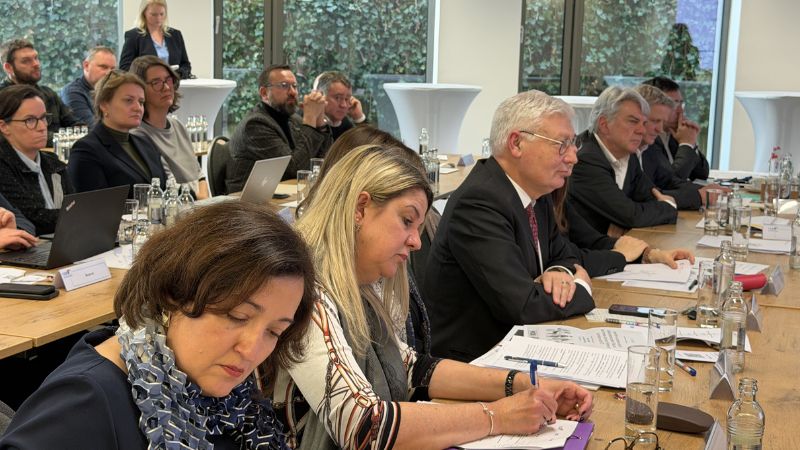

Addressing gender equality in the digital and AI era
CESI organised a conference in Luxembourg in the framework of eQualPRO, under the title “Equality at work in Europe: honouring the past, shaping the present, building the future.”
On 15 January 2026, CESI, together with the luxembourgish union CGFP, held a conference in Luxembourg as part of eQualPRO, bringing together stakeholders to discuss how gender equality at work can be strengthened at a time when digitalisation and artificial intelligence are reshaping workplaces and public services.
The first part of the programme offered a retrospective on the EU’s role in promoting equality, looking at the path from equality directives to current policies. Participants were invited to reflect on what has been achieved so far and what lessons should guide the next steps for equality in Europe.
The conference then turned to the present and future, focusing on how equality can be safeguarded and advanced as digital tools and AI become more widely used. Discussions centred on:
- Inclusive public administration and ensuring gender equality in the age of digitalisation and AI,
- Inclusive digital strategies to build a digital society that “leaves no one behind,”
- The need for legal frameworks and democratic accountability to protect equality in a digital society,
- Europe’s role in shaping the future, including gender equality within the Digital Decade and the regulation of AI.
A dedicated roundtable and open exchange brought these themes together around a key question: what are the opportunities and risks for gender equality in today’s and tomorrow’s world of work? The discussion was followed by a Q&A, allowing participants to share perspectives and priorities for action.
By hosting this conference under eQualPRO, CESI continues to create a space for dialogue on equality at work, connecting long-standing EU equality objectives with emerging challenges linked to digital transformation and AI—and helping ensure that technological change supports fairness and inclusion in workplaces and public services.
CESI organised a conference in Luxembourg in the framework of eQualPRO, under the title “Equality at work in Europe: honouring the past, shaping the present, building the future.”


CESI@noon on affordable housing
As rents and real estate prices continue to skyrock, CESI Youth held a CESI@noon lunchtime debate on possible EU measures for more affordable housing.
Europe is facing an increasingly severe housing affordability crisis. Over the past decade, rents and house prices have risen sharply while wages have failed to keep pace, leaving many Europeans struggling to secure decent and affordable housing. Today, one in ten people in the EU is overburdened by housing costs, and the situation is particularly acute for young people, single-parent households and low- to middle-income workers, according to a study produced for the European Parliament. Housing has become one of the most pressing social challenges in Europe, directly affecting social cohesion, labour mobility and quality of life.
Against this backdrop and in the context of CESI’s EU-funded PillACT project, CESI Youth organised a CESI@noon lunchtime debate on the European Commission’s newly launched European Affordable Housing Plan, bringing together representatives from European institutions, social partners and civil society representatives to explore how Europe can respond to the housing crisis in a way that is socially just, inclusive and sustainable. The event placed housing firmly within the framework of the European Pillar of Social Rights, reaffirming that access to affordable, adequate housing is a fundamental social right and not merely a market commodity.
The discussion addressed the structural causes behind rising housing costs, including financialisation of housing, gentrification, shortages in social and affordable housing stock, touristification and speculative vacancies. Particular attention was paid to the barriers faced by young people and vulnerable groups in achieving housing independence, as well as the disproportionate impact of the housing crisis on young women and single parents. Speakers examined how energy efficiency and sustainability policies can be aligned with affordability objectives, ensuring that the green transition does not exacerbate housing inequalities.
A central focus of the event was the European policy response in line with the objectives of the European Pillar of Social Rights. Participants discussed the proposed European Affordable Housing Plan, the need for stronger EU-level investment in social and public housing, and the potential of a possible European Housing Guarantee to ensure that no household spends more than 30% of its income on housing. The role of cohesion policy, energy policy and the European Parliament’s work on the housing crisis were also explored, as potential ways to mitigate the challenges driven by the housing crisis.
Hans Dubois, Senior Researcher at the European Foundation for the Improvement of Living and Working Conditions (Eurofound), explained housing trends in the EU, highlighting the multifaceted impacts of the housing crisis on different regional, demographic and economic population categories.
Bogdan-Alexandru Chelariu, EU Policy Officer at the CEE Bankwatch Network, stated: “The link between the EU’s energy-efficiency renovation investments and housing policy is becoming increasingly important. Both cohesion policy funds and the EU’s Recovery and Resilience Facility are heavily investing in large-scale projects aimed at cutting building sector emissions. Even without merging the two policies, pursuing decarbonisation of the building sector while explicitly considering its effects on housing could have an unexpected positive spillover, helping to address the evolving housing crisis.'
Annika Sparrer, Policy and Membership Development Officer at Eurodiaconia, concluded: “We have to build a housing market based on housing needs, not market demands. Therefore, public money must be channelled to those acting in public interest: social and not-for-profit housing providers as well as social service providers that support people in need.
MEP Alicia Homs, Spanish member of the European Parliament and member of the Housing Special Committee, declared: “The housing crisis will not be solved by the market alone. From the housing Committee, we stand for regulation, public and social housing, fighting speculation and protecting tenants. Because without decent housing, there will not be a social Europe.”
Antonello Pietrangelli, newly elected CESI Youth Representative, highlighted: “Housing is not just an economic issue but a question of social justice, it is a public good, a fundamental right and the cornerstone of human dignity - not merely a market commodity. Let’s make it work for young people for their present and future life.”
As rents and real estate prices continue to skyrock, CESI Youth held a CESI@noon lunchtime debate on possible EU measures for more affordable housing.


Revision of EU Carcinogens Directive must consider health & safety for firefighters
CESI urges a consideration of the heath & safety for firefighters in the current revision of the Directive Carcinogens Directive 2004/37/EC.
The EU institutions are currently considering a revision of the EU Directive 2004/37/EC on the protection of workers from the risks related to exposure to carcinogens or mutagens at work, by adding new substances and exposure limit values to the current directive.
CESI welcomes the proposal of the European Commission to add a binding EU occupational exposure limit value for polycyclic aromatic hydrocarbons (PAHs) mixtures, a necessary step that can significantly improve prevention for workers who are frequently exposed to PAHs, including firefighters that are at frequent risks of exposure during operations.
CESI Secretary General Klaus Heeger said: "For firefighters, the value of the proposal is not only the numerical limit: It also strengthens prevention duties under the directive by anchoring clearer expectations for employers on risk assessment, exposure measurement strategies, substitution/controls where feasible, hygiene and decontamination measures, personal protective equipment measures and occupational health surveillance – especially because PAHs exposure often occurs in peaks and in complex mixtures during fire events and post-fire clean-ups."
CESI welcomes that the European Parliament’s draft report does not seek to weaken the PAHs limit value set out in the European Commission’s proposal, but instead aims to further strengthen its worker-protection and implementation dimension, including in ways that are particularly relevant for firefighters. CESI counts on MEPs to adopt a committee report and trilogue mandate that will:
- ensure that employers of firefighters, including volunteer firefighters, will need to assess risks under the directive of exposure to carcinogens, mutagens and reprotoxic substances and take the necessary measures to protect the health and safety of those workers.
- seek to improve data collection about work-related health problems due to exposure of agents falling under the proposal, including PAHs. This is a necessary precondition tobetter detect and recognise occupational cancers.
- strengthen expectations on training when workers are exposed or likely to be exposed tocarcinogens, mutagens or reprotoxic substances, or when risks change.
CESI Secretary General Klaus Heeger added: "As MEPs enter the amendment phase in their deliberations, we expect that a strong stance will be taken to further specify necessary and concrete health and safety implementation measures to better protect firefighters and emergency services personnel,as proposed in amendment 14 of the European Parliament's draft report, which clearly states that firefighters and emergency services personnel are particularly at risk of exposure to reprotoxic substances, mutagens and carcinogens such as PAHs."
CESI urges a consideration of the heath & safety for firefighters in the current revision of the Directive Carcinogens Directive 2004/37/EC.


From Nuremberg to Caracas: Reason, power and Europe’s choice
Opinion article by CESI Secretary General Klaus Heeger.
Eighty years ago, in the ruins of post-war Europe, something radically new was attempted. At Nuremberg, the victors of the Second World War did not simply punish the defeated. They placed themselves — at least in principle — under the same legal standards they were imposing on others. Power submitted itself to law. As U.S. chief prosecutor Robert Jackson famously put it, this was “one of the most significant tributes that Power has ever paid to Reason.”
From Nuremberg to Caracas, the question is whether that tribute still holds.
The four core crimes — then and now
The Nuremberg Trials laid the foundations of modern international criminal law by defining what later became known as the four core crimes: crimes against peace, war crimes, crimes against humanity, and conspiracy to commit them. The revolutionary idea was not only that individuals — including political and military leaders — could be held personally accountable, but that aggressive war itself was a punishable crime.
This legacy lives on in today’s international legal architecture, from the Geneva Conventions to the International Criminal Court. Yet its authority rests on a fragile assumption: that no actor is above the law, and that legality — not raw power — governs international relations.
That assumption is increasingly under strain.
Reason over force — a fading ideal?
The moral core of Nuremberg was reason over force. Law was meant to civilise power, not eliminate it. Military strength was not rejected — but subordinated to legal restraint.
Benjamin Ferencz, one of the Nuremberg prosecutors and later a tireless advocate for international justice, dedicated his life to defending this balance. His message was simple: lasting peace cannot be built on selective legality. When states invoke legal principles against adversaries while quietly suspending them for themselves or their partners, the entire system erodes.
Recent developments suggest that warning was not heeded.
From the strength of law to the law of the strong
Today, the international order increasingly resembles the opposite of what Nuremberg envisioned. Instead of the strength of law, we see a return of the law of the strong — the idea that military capability and geopolitical interest override legal norms.
Europe itself is caught in this contradiction. On the one hand, it presents itself as a global champion of multilateralism and international law. On the other, it applies those principles unevenly.
In recent cases involving alleged violations of international humanitarian and criminal law — cases that are structurally comparable under the same legal framework — European reactions have differed markedly depending on political context and strategic alignment. Legal obligations are interpreted strictly in some instances, cautiously or selectively in others.
The message this sends is deeply corrosive: international law is universal in theory, but conditional in practice. A legal order built on double standards does not merely lose moral authority — it loses credibility as law.
Caracas as a mirror
This is where Caracas enters the picture.
Last week’s dramatic events in Venezuela, culminating in the use of military force to remove a sitting head of state, mark a profound escalation in the normalisation of power politics. Whatever one’s assessment of the regime in question, the method matters. Regime change by force, without a clear and broadly accepted legal mandate, revives precisely the logic Nuremberg sought to bury: that might makes right, if exercised by the “right” actors.
Caracas is not an isolated incident. It is a mirror reflecting a wider trend — the growing readiness to bypass legal frameworks in the name of urgency, morality, or strategic necessity. History teaches us that such shortcuts rarely strengthen justice. They weaken it.
Europe’s responsibility: Europe first — but how?
What is particularly painful today is the recognition that Europe often finds itself trapped in a deadlock: it condemns breaches of international law but struggles to influence outcomes, while open confrontation risks political costs. Selective silence undermines credibility, and protest can seem naïve — a challenge painfully evident in the context of Russia’s war in Ukraine.
Breaking this deadlock requires acknowledging a hard truth: respect in international affairs depends on strength. For Europe’s voice to matter, it must grow stronger economically, politically, and militarily.
“Europe first” should mean consolidation — prioritising the economy and single market, defending trade interests, deepening pragmatic partnerships, and building a credible European Defence Union.
This includes developing greater military integration, enhancing cybersecurity, strengthening cooperation with NATO, and protecting critical infrastructure, all spurred by the geopolitical challenges posed by Putin and global instability.
Paradoxically, the only way out may be for Europe to loosen some of its own principles — to act with greater pragmatism, realpolitik, and self-interest. By pursuing strategic autonomy, Europe can reduce dependency on external powers like China or the US in critical sectors such as digital technology, energy, and green innovation, while maintaining openness to trade and collaboration.
By becoming a stronger and more credible actor economically, politically, and militarily, the EU would gain the weight necessary to defend the rules-based international order it champions.
In other words, only by being more strategically self-interested can Europe effectively uphold its values and ensure that a liberal, rules-based world remains viable.
The Nuremberg test — 80 years on
Eighty years after Nuremberg, the test is no longer whether international law exists. It does. The test is whether it binds the powerful as much as the weak, partners as much as adversaries, “our side” as much as “theirs”.
From Europe’s eastern borders to the Middle East, from international courts to Caracas, the same question returns: do we still believe that reason should prevail over force — or only when it is convenient?
If Europe abandons that belief, it does not merely betray a historical legacy. It undermines its own strategic identity. In a world drifting back toward spheres of influence and raw assertion, Europe’s strength lies not only in arms, but in the credibility of law.
Nuremberg was never about the past. It was a warning for the future. Whether we heed it — or repeat the errors it sought to prevent — is now a matter of choice.
Opinion article by CESI Secretary General Klaus Heeger.


Europe’s Affordable Housing Plan: Essential for young workers and the EU at large
The EU’s Affordable Housing Plan is a first step towards tackling the housing crisis, which disproportionately affects young workers across Europe.
The European Commission has unveiled its Affordable Housing Plan, addressing one of the EU’s most pressing social challenges: the housing crisis. After years of rising prices and rents, access to affordable housing has deteriorated across Europe. While non-legislative and fully respecting Member States’ competences, the Plan lays the groundwork for future regulatory, legislative, and funding initiatives.
The Housing Plan is structured around four pillars and ten actions, combining investment, regulation, structural reform, and social protection.
Pillar I focuses on increasing housing supply and mobilising EU public and private investment, particularly for social and affordable housing.
Pillar II addresses market pressures through regulation, including short-term rental rules, improved data transparency, and measures to curb speculation.
Pillar III promotes structural reforms at Member State level to improve planning, land use, social housing provision, and affordability, supported by EU guidance and funding.
Pillar IV targets those most affected by the crisis, notably young people and students, by improving access to housing and promoting innovative solutions.
The European Strategy for Housing Construction supports these pillars through increased productivity, innovation, faster and digitalised permitting, and the scaling-up of modular construction. However, the Affordable Housing Plan relies mainly on coordination and soft law, with no binding legislation or dedicated EU funding. A European Housing Alliance and the first EU Housing Summit aim to strengthen cooperation and multi-level governance.
The Plan highlights best-practice examples from across Europe, including Spain’s industrialised construction programme (PERTE), the Netherlands’ streamlined permitting system under the “Omgevingswet”, Estonia’s fully digitalised building permit process, Germany’s “Hamburg Standard” to reduce construction costs, Portugal’s RRF-backed Affordable Student Housing programme, and Finland’s Housing First model, which has delivered sustained reductions in homelessness.
Between 2010 and 2023, house prices in the EU increased by around 48%, while rents rose by approximately 22%, with incomes failing to keep pace. Young people have been disproportionately affected, facing growing barriers to independent living and an increased risk of overcrowded and insecure housing.
Klaus Heeger, CESI Secretary General, states:
“The EU’s Affordable Housing Plan is a necessary first step. To uphold Europe’s social model, it must deliver on affordability and accessibility while safeguarding competitiveness and advancing green objectives. This will require coordinated action, sustained investment, and long-term reform.”
Antonello Pietrangeli, CESI Youth Representative, reacts:
“For millions of young workers, housing costs are a long-term barrier to stability. High rents and unaffordable bank loans limit mobility, education, and career opportunities. Living pay cheque to pay cheque just to cover housing costs is not sustainable.”
Next steps
In 2026, the European Commission will launch a Pan-European Investment Platform for Affordable and Sustainable Housing to help close the €150 billion annual investment gap. The Platform will bring together public and private actors, share financing options and best practices, and support project development, helping turn EU commitments into concrete, locally adapted housing solutions.
The EU’s Affordable Housing Plan is a first step towards tackling the housing crisis, which disproportionately affects young workers across Europe.


Looking back, moving forward | Editorial of SG Klaus Heeger
CESI SG Klaus Heeger reviews major political and social developments at the close of the year and looks ahead with confidence to the challenges of 2026.
Dear members, partners and friends,
These final days of the year provide an opportunity to reflect on what we have accomplished together and to look ahead with confidence and determination.
Throughout 2025, CESI has remained firmly committed to defending workers’ rights and strengthening Europe’s social model in times of profound change. From the Court of Justice’s clear affirmation of the Minimum Wages Directive to the European Commission’s Quality Jobs Roadmap, important political signals have confirmed what trade unions have long argued: fair wages, strong collective bargaining and quality working conditions are not obstacles to competitiveness, but its foundation.
CESI continues to translate these principles into action.
We have contributed actively to key debates on working time in the armed forces, the regulation of artificial intelligence at work, active labour market policies, gender equality in defence employment and the future of Europe’s industrial base under the Green Deal.
At every step, our message is consistent: transitions must be fair, inclusive and shaped with workers and their representatives.
This year has also been marked by important moments within our organisation. I am particularly pleased to welcome FP CFE-CGC, which joined CESI in June, as well as FISMIC-CONF.S.A.L., further strengthening our confederation and reinforcing our collective voice at European level.
At the same time, CESI Youth enters a new chapter, building on a strong legacy and renewing its commitment to representing young workers in an evolving world of work.
None of this would be possible without the dedication of our member organisations, experts, partners and staff. Your engagement ensures that CESI remains a credible, independent and forward-looking European social partner.
As the festive season approaches, I would like to extend my warmest wishes to you and your loved ones. I wish you a peaceful and joyful Christmas, and a healthy, successful and hopeful New Year. May 2026 bring renewed solidarity, progress and strength to all those who stand up for social justice and decent work across Europe.
With my sincere thanks and kind regards,
Klaus Heeger
Secretary General
CESI SG Klaus Heeger reviews major political and social developments at the close of the year and looks ahead with confidence to the challenges of 2026.


Conference on equality policies in Spain
CESI, with the support of its Spanish member CSIF, organised a conference in Madrid to discuss EU gender equality policies and their implementation in Spain.
On 11 December 2025, CESI organised a conference in Madrid on “Equality Policies in the European Union: Towards Gender Equality in the Workplace in Spain”, with the support of its Spanish member organisation CSIF. The event brought together trade union representatives, equality practitioners and institutional stakeholders to reflect on European and national approaches to advancing gender equality at work.
Held at CSIF’s national headquarters, the conference focused on the implementation of European Union equality legislation and its impact on working conditions, equal opportunities and work–life balance in Spain. Discussions underlined the importance of translating EU standards into concrete improvements for workers and of strengthening social dialogue in this area.
Participants examined the broader EU legal framework for gender equality, including key directives and policy instruments aimed at addressing structural inequalities in the labour market. Particular attention was paid to measures designed to reduce the gender pay gap and to promote transparency in remuneration systems.
The programme also addressed European initiatives supporting work–life balance, with a focus on reconciliation policies, care responsibilities and the challenges linked to national transposition and practical implementation. Exchanges highlighted the need for comprehensive public policies that support both women’s participation in the labour market and a more balanced sharing of care responsibilities.
The conference further explored the close link between employment, care and gender equality, stressing that progress in this field requires coordinated action by public authorities, employers and trade unions. The discussions reaffirmed the central role of trade unions in promoting equality, monitoring the application of EU legislation and advocating for fair and inclusive labour markets.
The event took place in the frame of CESI's 'eQualPRO' project.
CESI, with the support of its Spanish member CSIF, organised a conference in Madrid to discuss EU gender equality policies and their implementation in Spain.


Urgent call by European civil society to the European leaders and the leadership of the EU
As a proud member of the European Movement International (EMI), CESI fully supports the urgent call to defend democracy, uphold fundamental rights and the rule of law, and strengthen the EU’s capacity to act in the face of geopolitical challenges.
The European Union is facing unprecedented challenges at a time when the UN-based multilateral order is under sustained attack. Russia’s war of aggression against Ukraine, and Trump’s confrontational posture towards the EU, as confirmed by the recently published National Security Strategy, are existential threats to the future of European democracy and our fundamental freedoms.
European leaders and the EU institutions must stand firmly by our values, and by doing so demonstrate the strength of the European Union and its utility in defending European security, prosperity, legal order and human rights, the very things that Europeans have come to expect from our Union.
As much as we would like to believe that the US remains an ally, public statements by President Trump and leading figures in his administration make it abundantly clear that one-sided concessions have neither reduced unpredictability nor strengthened transatlantic stability.
On the contrary, we find ourselves confronted with an outspoken critique of the EU and what it stands for, and a concerted assault on our democratically elected governments and EU institutions, with the declared intention to bring to power extremist-populist movements that will bring back a divided Europe of nationalism, fragmentation, weakness and vassalage.
The National Security Strategy seeks to undermine the foundations of the European project, a democratic Union founded on values and rule of law. It explicitly endorses far-right and nationalistic actors who seek to undermine our fundamental rights and undermine the EU’s ability to defend those rights.
Europe must therefore draw the necessary conclusions: our security and defence, our prosperity and democracy can be safeguarded only if we pull together. Strategic autonomy is an absolute necessity. The European Union must quickly adapt, be enabled to act as an independent actor, assume full responsibility for its own security and defence, pursue its interests and defend its founding values internally as well as on the global stage with enhanced credibility and with shared sovereignty between its Member States, while pursuing renewed political and economic cooperation with likeminded states.
Only through reasserting its support for democratic governance, human rights, economic prosperity and social rights can the EU strengthen social cohesion and democratic resilience in the face of attempts to divide and fragment our Union. In addition, the EU can and must fill the vacuum left by the US in the global multilateral system, actively uphold international law and protect multilateral bodies such as the UN.
A precondition for both geopolitical power and social security is the pursuit of a more competitive Europe, able to deliver common prosperity for Europeans. The full implementation of the Letta and Draghi reports on the completion of the Single Market and on European competitiveness by 2028 can help the EU meet that objective. A competitive Europe is also a sustainable Europe; efforts to simplify EU laws must not be sought at the cost of dismantling core elements of environmental and social protections.
We also need to equip the EU with a budget of a size adequate to finance genuine European public goods, including in defence, research and innovation, housing, education and skills, while preserving social and environmental protections, regional cohesion and agriculture policy.
Furthermore, the EU budget must continue supporting a vibrant civil society, and a global Europe whose external relations and development assistance are rooted in EU values, with full respect for parliamentary control and the role of regions and cities. This new, enhanced budget should be financed through ambitious and genuine EU own resources.
However, regaining competitiveness and modernising the budget are not sufficient to build a geopolitical Europe. Therefore, Member States in the European Council of the EU must move swiftly towards European Common Defence as provided for in Article 42 of the Treaty on European Union. In the absence of unanimity, this can be achieved through a new Permanent Structured Cooperation among the willing Member States, or an ad hoc treaty as was done when establishing the Schengen Agreement for free movement (the “Schengen of Defence”). This must lead to a true European Defence System capable of pulling together Member States’ armed forces in the event of aggression against any Member State, including the strengthening of the Rapid Deployment Capacity and the creation of a European command-and-control centre.
To achieve this, we must move boldly towards closer integration if we are to cope with these critical challenges, ensuring European sovereignty and respect for fundamental values and rights. Ambitious decisions and political leadership are needed, beyond narrow national interests and personal political aspirations. If we fall short, if we are not brave enough to meet this challenge united, we risk perishing divided, forced to accept that the fate of the world is decided under the political authority of Donald Trump, in an ambiguous partnership with Vladimir Putin and Xi Jinping.
To that end, Europe needs to move beyond national vetoes for decisions on foreign policy, defence and shared finances, which prevent the Union from acting quickly when needed most. The power to block progress removes the incentive for compromise and consensus building. In all democratic systems, decisions are made by majority, and the EU has shown its ability to integrate and accommodate the views of all its members when agreement is needed on issues of importance to the Union as a whole. The existing Treaties include clauses (the so-called “passerelle” clauses) that allow the shift from unanimity to qualified majority voting but are yet to be utilised. Decisions on budgetary and fiscal policy, foreign, security and defence policy, as well as accession of new Member States, must take place using qualified majority voting, including future Treaty revisions.
Alongside the Member States in the European Council, the European Parliament has an essential role in driving these changes. It can build wider support by bringing together national parliaments and citizens through joint assemblies designed to involve them directly in shaping and endorsing the necessary policy changes.
We therefore plan to pursue the creation of a renewed, cross-partisan and inter-institutional pro-European coalition, bringing together the most committed Member States in the European Council, the pro-European majorities in the European Parliament and national parliaments, the European Commission, regional and local authorities, and organised pro-European civil society. Together, we will mobilise at local, national and European level in support of these objectives, with the aim of building urgently and immediately a more sovereign, more democratic and more effective European Union.
12. December 2025
European Movement International
As a proud member of the European Movement International (EMI), CESI fully supports the urgent call to defend democracy, uphold fundamental rights and the rule of law, and strengthen the EU’s capacity to act in the face of geopolitical challenges.


The EU Green Deal and Automotive Package: Competitiveness alongside innovation
A responsible EU Automotive Package under the Green Deal is needed to safeguard jobs, industry and Europe’s competitiveness.
CESI and FISMIC-CONFSAL call on the EU institutions: The upcoming EU Automotive Package must ensure a balanced approach between climate ambition for the Green Deal, social sustainability and industrial resilience. The Automotive Package must put at its centre realistic, technologically neutral rules capable of supporting employment, supply chains and innovation.
A revision of CO₂ standards for cars and vans as foreseen in the Package is a crucial opportunity to prevent competitive imbalances, especially in light of the recent regulatory rollbacks in the car industry in the United States.
As the international automotive environment evolves rapidly, CESI and FISMIC-CONFSAL underscore key priorities to guarantee European competitiveness and capability in its car industry are not left behind. As such, the Automotive Package must ensure:
• full technology neutrality in the car industry, including electric, hydrogen, advanced hybrids, biofuels and e-fuels
• flexibility on intermediate objectives (2025–2027 and 2030) and avoidance of unsustainable fleet-compliance penalties
• a clear review of the current system of EU fleet-compliance sanctions, which must not jeopardise production, investment or employment during current transitions
• a dedicated roadmap for heavy-duty vehicles (HDVs) and immediate investment in supporting infrastructure
• defending Europe’s car industry from global unfair competition
• protecting workers affected by transitions through reskilling programmes and structured social dialogue
CESI and FISMIC-CONFSAL call for an Automotive Package which reflects a Green Deal based on provisions that are fact-based, sustainable and proportioned to the EU’s industrial capabilities.
FISMIC-CONFSAL President Roberto Di Maulo commented:
“The industrial and automotive ecosystem is vital for Italy and for Europe. Regulation must accompany innovation, not stifle it. Protecting jobs and competitiveness is essential to ensuring a truly sustainable transition.”
CESI Secretary General Klaus Heeger said:
“Europe cannot afford a transition that erodes its industrial capacity or leaves workers behind. We support ambitious climate action, but realism, technology openness and social fairness are essential.”
The full joint statement is available here.
A responsible EU Automotive Package under the Green Deal is needed to safeguard jobs, industry and Europe’s competitiveness.
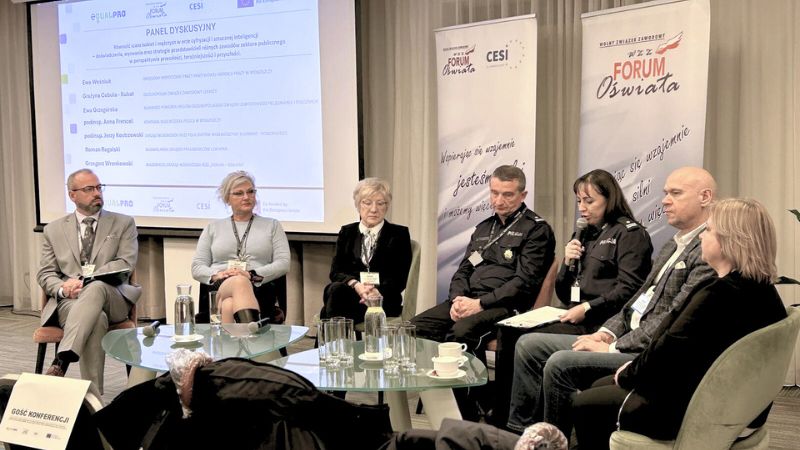

eQualPRO in Poland: Advancing gender equality in the digital age
CESI organised a national conference in Poland under the eQualPRO project, focusing on gender equality in the context of digitalisation and artificial intelligence, with the support of its Polish member WZZ.
On 4 December 2025, CESI organised a national sectoral conference on gender equality in the era of digitalisation and artificial intelligence in Bydgoszcz, Poland, with the support of its Polish member organisation WZZ. The event took place within the framework of the EU co-funded project "eQualPRO".
The conference brought together representatives of trade unions, public institutions, social partners and experts from across the public sector to examine how digital transformation and artificial intelligence are reshaping the world of work, with a particular focus on their impact on women’s equality, opportunities and working conditions.
Discussions focused on the legal, institutional and policy dimensions of gender equality in the context of rapid technological change. Participants highlighted both the opportunities offered by digitalisation, such as increased flexibility and access to employment, and the challenges, including unequal access to digital skills, persistent gender pay gaps and the risk of bias embedded in algorithmic systems.
The role of European and national policies in promoting gender equality was emphasised, alongside the importance of social dialogue and cooperation between trade unions, employers and public authorities to ensure that technological transitions are fair, inclusive and sustainable.
A key element of the programme was a cross-sectoral panel discussion, gathering perspectives from education, healthcare, uniformed services, employers’ organisations and labour inspection authorities. The exchange addressed gender equality in both female-dominated and male-dominated professions, enabling a comprehensive discussion grounded in practical experience.
The debate examined gender equality from three perspectives:
- Past – the contribution of EU action to advancing gender equality and the progress achieved
- Present – current challenges faced by women at work, including digitalisation, telework and changing work organisation
- Future – strategies to address risks related to artificial intelligence and to harness data and innovation in support of equality
The conference facilitated a practical exchange of experiences, highlighted good practices, and contributed to the formulation of recommendations aimed at reducing gender inequalities in employment, career progression and pay. It also strengthened cooperation between social partners and institutions at local, national and European level.
By addressing gender equality through the lens of digitalisation and artificial intelligence, the event reinforced CESI’s commitment to equal opportunities, social dialogue and decent working conditions in Europe’s evolving world of work.
CESI organised a national conference in Poland under the eQualPRO project, focusing on gender equality in the context of digitalisation and artificial intelligence, with the support of its Polish member WZZ.
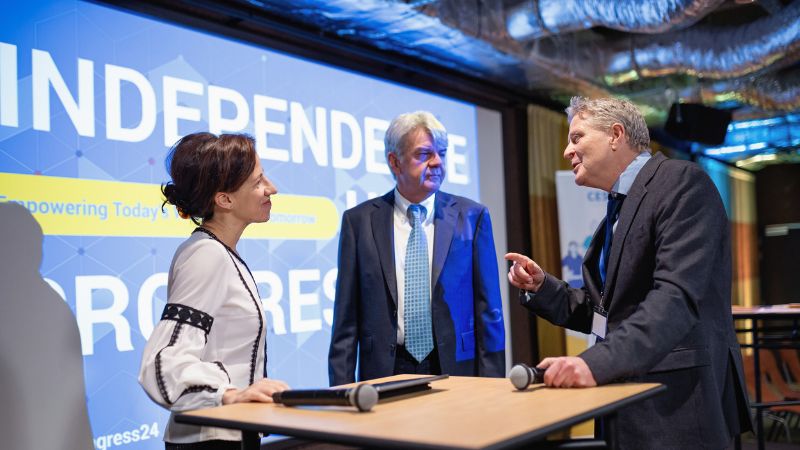

Quality Jobs Roadmap: Time to deliver
CESI welcomes the Quality Jobs Roadmap and calls for binding action and tough enforcement to turn it into real gains for workers.
Today, the European Commission presented its Quality Jobs Roadmap (QJR), placing quality work at the centre of Europe’s competitiveness and social model. CESI welcomes this commitment. Job quality is not a secondary issue: it is essential for productivity, trust, social cohesion and Europe’s ability to manage green, digital and demographic transitions.
CESI has long called for a specific and comprehensive EU approach to quality employment to complement the European Pillar of Social Rights. The Roadmap must guarantee fair working conditions, decent wages, secure employment, strong social protection, economic security and inclusive labour markets. CESI urges the Commission to adopt an ambitious and enforceable framework capable of addressing the pressing challenges facing workers across Europe.
CESI agrees with the four priority areas where, according to the Roadmap, EU action is most needed:
· Psychosocial risks and mental health at work
· Responsible algorithmic management and the use of AI at work
· Right to disconnect and telework
· A review of occupational safety and health rules for digital workplaces, including the revision of the Display Screen Equipment Directive (90/270/EEC)
The Roadmap is a positive step forward. It acknowledges that quality jobs and competitiveness reinforce each other and confirms the central role of trade unions and social dialogue in shaping fair transitions. The Commission’s intention to propose a Quality Jobs Act and to launch social partner consultations is welcome, and CESI will engage constructively.
However, the Roadmap alone will not close Europe’s job-quality gaps. Workers cannot depend on principles without effective delivery. To have real impact, the Roadmap must be backed by binding guarantees, clear timelines and adequate resources, ensuring tangible improvements across Member States and sectors.
Moreover, improving job quality requires a coherent legislative and non-legislative approach. CESI calls for aligning the Quality Jobs Roadmap with other EU initiatives, such as:
· a revision of the Public Procurement Directive, with obligations for beneficiaries of public money to apply quality work standards for their workers
· the implementation of the EU’s multisectoral guidelines on third-party violence, as co-negotiated by CESI
· sector-specific actions for quality work in areas such as health care, education and public services
· the upcoming EU Teachers Roadmap
· the Roadmap for Women’s Rights and the forthcoming EU Gender Equality Strategy.
Only through a sectoral and cross-sectoral approach can comprehensive and applicable provisions be achieved.
The Quality Jobs Roadmap must also support the effective implementation of recent and existing EU directives, including:
• the Minimum Wage Directive (2022/2041)
• the Pay Transparency Directive (2023/970)
• the Women on Boards Directive (2022/2381)
• the Directive on Combating Violence Against Women (2024/1385)
Even the strongest rules are ineffective without proper enforcement. The Roadmap itself notes the uneven application of EU labour standards across Member States and the need for stronger tools, guidance and inspections. CESI fully agrees. Europe must ensure that rights on paper become rights in practice through effective labour inspections, accountability mechanisms and consequences where violations occur.
Building on its consultation contribution, CESI will push for:
· strong and inclusive social dialogue and collective bargaining;
· decisive action against precarious and insecure work;
· worker-centred AI and algorithmic management rules, including transparency, human oversight and limits on surveillance;
· an enforceable right to disconnect for all workers;
· a modernised OSH framework, including an updated Display Screen Equipment Directive, addressing psychosocial and ergonomic risks in digital and hybrid workplaces;
· investment in quality public services and their staff, tackling shortages and supporting fair transitions;
· monitoring and, if needed, contributing to the enforcement of EU legislation and case-law as well as to the implementation of the European Pillar of Social Rights, both at European and national level.
CESI Secretary General Klaus Heeger said, “Our message is clear: Europe needs a Quality Jobs Roadmap — and a Quality Jobs Act — that delivers real improvements for workers, backed by serious enforcement of existing rights!”
CESI welcomes the Quality Jobs Roadmap and calls for binding action and tough enforcement to turn it into real gains for workers.
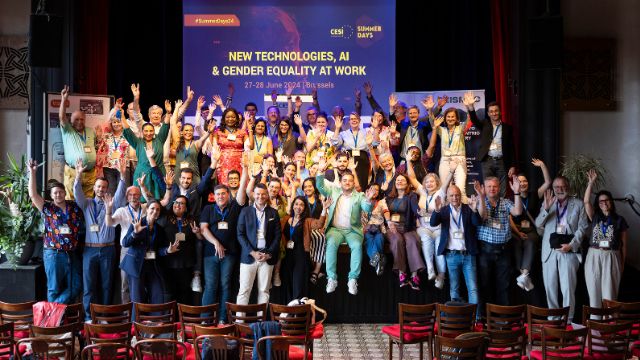

#eQualPROCampaign: Where is gender equality in the AI era?
In the AI era, gender equality at work will not happen by default—it requires transparency, regulation and strong trade union involvement.
Artificial intelligence and digitalisation are reshaping work across Europe. However, without adequate safeguards, they risk reinforcing long-standing gender inequalities.
The #eQualPROCampaign is a dynamic initiative developed under the EU co-funded eQualPRO project of the European Confederation of Independent Trade Unions (CESI). The campaign promotes gender equality in workplaces across Europe by raising awareness of the challenges women face in the digital and AI era, while highlighting the pivotal role of trade unions and social partners in shaping gender-responsive policies capable of delivering fairer and more equal workplaces.
Turning gender equality into real workplace change
The eQualPRO project was launched to ensure that equality does not lag behind innovation. In a fast-paced digital world, gender equality risks being marginalised—or even undermined—by technological change. By addressing biases embedded in digital tools and strengthening the capacity of trade unions, eQualPRO promotes a gender-balanced framework in which regulation and innovation evolve in parallel.
The project equips trade unions and social partners with concrete tools to monitor, influence and enforce gender equality at work, including in the context of AI and digitalisation.
Key project activities
Key activities under the eQualPRO project include:
- National conferences: Hybrid sectoral conferences hosted by CESI member organisations across EU countries, focusing on the latest developments and updates from EU institutions on gender equality strategies and targets.
- European conferences: European-level conferences exploring strategies to bridge gender gaps and foster inclusivity in Europe’s evolving digital and industrial landscape.
- Training seminars: Hybrid European training seminars aimed at providing national trade union representatives with key updates on equality legislation, relevant data and policy publications.
A shared responsibility for a fair digital transition
eQualPRO demonstrates that transparency, gender awareness and strong social dialogue are essential to achieving a fair and inclusive digital transition.
The project confirms that gender inequality at work remains measurable and persistent across the EU:
- Women continue to earn less, are more likely to work part-time, and remain under-represented in decision-making and ICT roles.
- Structural barriers continue to slow career progression and limit women’s influence over digital and organisational change.
While the EU AI Act represents a significant step forward, eQualPRO finds that it is not gender-proof by default. Weak provisions on gender impact assessments and worker participation risk leaving structural inequalities unaddressed. A gender-focused and equality-driven approach to AI regulation is essential: AI is not neutral. Biased data and male-dominated development teams can reproduce discrimination in recruitment, pay and promotion.
Trade unions therefore play a crucial role in demanding:
- Targeted training opportunities for women in STEM and ICT,
- Algorithmic transparency and enforceable audit rights,
- Strong worker representation in AI governance.
Without trade union oversight, AI risks locking in inequality instead of reducing it.
Visual campaigns: Engaging through multimedia
To disseminate its message effectively, the #eQualPROCampaign uses a range of multimedia tools, including campaign videos and infographics. These visual materials translate complex information into accessible messages, highlighting the importance of transparent regulation, unbiased AI systems and the active involvement of trade unions in shaping labour market reforms.
Continuing the impact
The #eQualPROCampaign shows that with transparency, gender awareness and strong social dialogue, a fair and inclusive digital transition is possible. The project’s impact does not end here: it continues through the active engagement of trade unions, transforming principles into enforceable workplace rights.
In the AI era, gender equality at work will not happen by default—it requires transparency, regulation and strong trade union involvement.


New year, new leadership for CESI Youth
CESI thanks Matthäus Fandrejewski for twelve years of dedicated leadership of CESI Youth and welcomes Antonello Pietrangeli as its new Youth Representative, opening a new chapter for youth representation in CESI.
After twelve years of dedicated service, CESI bids farewell to the long-standing Youth Representative, Matthäus Fandrejewski, who is stepping down from his role. We extend our sincere gratitude to Matthäus for his unwavering commitment and dedication in placing CESI Youth on the European map of youth advocacy, and we are pleased to announce that Antonello Pietrangeli will assume the position of Youth Representative. This transition marks both a moment of recognition for the work achieved to date and a fresh chapter for CESI Youth as it continues to grow and strengthen its voice within CESI.
Matthäus has been instrumental in establishing CESI Youth as a credible, dynamic, and truly representative organisation. From its early foundations to its current standing, he has worked tirelessly for over a decade to expand membership, amplify young workers’ perspectives, and ensure that CESI Youth earned its place in social dialogue. Thanks to his strategic vision and persistence, the youth section has developed into a respected actor, contributing meaningfully to CESI’s positions and securing a seat at the table where decisions affecting the future of work are shaped.
Building on this strong legacy, Antonello Pietrangeli brings new energy and a forward-looking agenda to the role. His priority will be to upgrade and modernise the youth section to meet emerging challenges, with a particular focus on the future of work, skills development, and the implications of artificial intelligence for young workers.
In this journey, Antonello will be supported by Vice-President Isabel Garcia Sanchez and by a cohesive and united board composed of Ester Amores Lizcano, Alessandro Albergoni, Tania Basso, Stevie Kosch, Sandra Paartalu, Mantas Stanzys, and Moesha Naomi Van der Smissen. Each of them will play a central role in guiding this new phase and further strengthening the impact and representativeness of CESI Youth.
With Antonello’s leadership, backed by a competent, determined, and united team, CESI Youth will deepen its engagement on these themes, ensuring that young people are not only heard but actively shaping the policies and workplaces of tomorrow.
CESI thanks Matthäus Fandrejewski for twelve years of dedicated leadership of CESI Youth and welcomes Antonello Pietrangeli as its new Youth Representative, opening a new chapter for youth representation in CESI.


Spain: CSIF achieves pay rise and reforms
CESI member organisation CSIF has secured a retroactive 2025 pay rise for Spain’s public-sector workers and a multi-year wage deal through 2028. The agreement totals an 11.4% increase and includes wider improvements to working conditions and public services.
CESI member organisation CSIF has welcomed a long-awaited pay agreement for Spain’s public-sector workforce, following months of mobilisation and a negotiation process that had remained at a standstill. The deal confirms the 2025 salary increase with retroactive effect and sets out a multi-year wage framework running from 2025 to 2028.
According to CSIF, the agreement will deliver a cumulative wage increase of 11.4% by January 2028, enabling public employees to recover an estimated 2.9% of lost purchasing power.
Key pay measures
The agreement foresees the following steps:
- 2025: a 2.5% rise, applied retroactively from 1 January 2025, with arrears to be paid from December 2025.
- 2026: a 4% increase from January 2026, plus a potential additional 0.5% if inflation (IPC) in 2026 reaches at least 1.5%. This variable component would be paid in early 2027, with retroactive effect.
- 2027: a further 4.5% increase from January 2027.
- 2028: the framework culminates in a total 11.4% uplift by January 2028.
Improvements beyond pay
CSIF also highlights that the agreement includes a broad package of measures aimed at strengthening working conditions and public services. These include:
- enhanced rights on leave and work-life balance;
- improved internal promotion pathways;
- merit-based recruitment, mobility and ongoing open competitions;
- faster hiring procedures and staffing reinforcement, including the removal of replacement-rate limits;
- commitments to modernise job classification systems;
- pension- and retirement-related measures;
- progress towards 35-hour working weeks and clearer regulation of telework within the central administration;
- a government commitment to improve healthcare coverage under Spain’s administrative mutual systems (MUFACE, MUGEJU and ISFAS).
A joint monitoring committee is to be established within 15 days of the agreement’s signature to oversee implementation of all measures.
CESI perspective
CESI underlines the importance of predictable, multi-annual wage frameworks and tangible improvements in working conditions to ensure quality public services and safeguard the attractiveness of public-sector careers. The agreement in Spain illustrates how sustained social dialogue — supported by workers’ mobilisation when necessary — can deliver concrete results for employees and citizens alike.
CESI member organisation CSIF has secured a retroactive 2025 pay rise for Spain’s public-sector workers and a multi-year wage deal through 2028. The agreement totals an 11.4% increase and includes wider improvements to working conditions and public services.


FISMIC-CONF.S.A.L. joins CESI
The Italian metal workers trade union FISMIC-CONF.S.A.L. has joined CESI.
At its last meeting of the year, CESI's Board approved of a application of the Italian metalworkers union FISMIC-CONF.S.A.L. to become a member trade union of CESI.
CESI Secretary General Klaus Heeger said: "We welcome FISMIC-CONF.S.A.L. as a new member in the CESI trade union family. We already know FISMIC well from previous cooperation during the last years, and weare glad to reinforce and deepen our mutual cooperation through a direct membership at CESI. The workers in the Italian automotive sector, which FISMIC represents, face major challenges in transformations of their industry towards greening and digitalisation - all of this in the context of increasing global pressures on competitiveness. We will be glad to assist them to the best of our capacities to achieve socially fair restructurings, to safeguard quality jobs for them in the future."
The Italian metal workers trade union FISMIC-CONF.S.A.L. has joined CESI.


End violence against women!
On 25 November, CESI joins organisations worldwide in marking the annual International Day for the Elimination of Violence against Women.
Established by the United Nations to raise awareness and mobilise action, the Day also opens the global ‘16 Days of Activism’ campaign, running until UN Human Rights Day on 10 December.
This year’s campaign theme shines a spotlight on the rapid rise of digital violence against women and girls – from online harassment and stalking to image-based abuse and threats that too often spill into offline harm. CESI fully supports this focus, as digital spaces are now part of daily life and working life, and must be safe for everyone.
Despite progress in legislation and awareness, violence against women is still widespread. Also in Europe, women face violence at home, in public spaces, and in the workplace – including harassment by colleagues, superiors and third parties. The scale of the problem is also under-reported, often due to fear, stigma, or lack of trust in reporting mechanisms.
For CESI, this is not only a human-rights emergency but also a trade union issue. Violence and harassment destroy health, dignity, careers and economic independence. They undermine equality at work and in society, and they disproportionately affect workers in public services and care sectors who are frequently exposed to third-party aggression.
CESI has long advocated a zero-tolerance approach to gender-based violence. We call on European institutions and national governments to strengthen prevention, protection, prosecution, and support for survivors - both in private life and at work.
In recent years, this commitment has been reinforced through practical initiatives:
• Through the EU co-funded eQualPRO project, CESI and its member organisations are mapping the impact of EU gender-equality policies in Europe, identifying remaining gaps and developing trade-union demands to improve equality in workplaces.
• In May 2025, CESI Secretary General Klaus Heeger also co-signed updated European multi-sectoral guidelines on third-party violence and harassment related to work, together with further European social partners. These guidelines provide a renewed framework to prevent violence from clients, patients, pupils, passengers and other third parties, and to ensure support and remedies for affected workers. They emphasise prevention through staffing, training, safe organisational practices and clear reporting procedures—measures that are also vital for tackling gender-based and digital forms of violence in today’s workplaces.
On this International Day, CESI urges:
• EU and national decision-makers to fully implement and enforce existing laws and to close remaining legislative gaps, including on online and workplace violence.
• Employers to adopt robust workplace policies, risk assessments, training and victim-centred reporting systems.
• Social partners to negotiate and apply collective agreements that guarantee safe working environments and real protection from harassment and violence.
• Society as a whole to challenge the norms and behaviours that perpetuate violence, in physical and digital spaces alike.
On 25 November, CESI joins organisations worldwide in marking the annual International Day for the Elimination of Violence against Women.


Hearing on the application of the Working Time Directive (WTD) in the armed forces
At a high-level hearing organised by the European Commission (DG EMPL and DG DEFIS), CESI presented its views on the application of the Working Time Directive (WTD) to military personnel across the European Union.
At a high-level hearing organised by the European Commission (DG EMPL and DG DEFIS), CESI presented its views on the application of the Working Time Directive (WTD) to military personnel across the European Union.
Secretary General Klaus Heeger delivered a comprehensive position outlining CESI’s long-standing commitment to ensuring fair, safe and sustainable working conditions for members of the armed forces. On behalf of CESI´s Expert Commission “Security and Defence”, Walter Hirsch, Eurofedop, highlighted specific difficulties encountered by the armed forces. Both emphasised that the WTD is a fundamental health and safety instrument that fully applies to armed forces personnel, except in narrowly defined exceptional circumstances.
“Protecting the health and well-being of servicewomen and servicemen is not an obstacle to operational effectiveness — it is a prerequisite for it”, Heeger stressed during the hearing. And Walter Hirsch underlined that “the WTD is well-designed and operational, if applied consistently and correctly, also in the spirit of the case-law of the European Court of Justice”.
The CESI delegation pointed out a number of challenges observed at Member States´ level, including excessive use of exemptions, limited access to compensatory rest, a lack of systematic working-time recording, and the improper use of long reference periods. These problems do not stem from the Directive itself, but from inconsistent national implementation.
Rather than revising the WTD, CESI calls on the Commission to provide clear EU-level guidelines, strengthen monitoring and enforcement, and promote reliable, digital working-time recording systems within the armed forces. CESI also stresses the fundamental importance of a wider and more structured social dialogue in the defence sector, ensuring that representative military associations are properly involved.
The event was part of a steady and constructive dialogue between the Commission and the social partners.
A detailed written statement that CESI submitted to the European Commission on the subject matter is available here.
.jpeg)
.jpeg)
At a high-level hearing organised by the European Commission (DG EMPL and DG DEFIS), CESI presented its views on the application of the Working Time Directive (WTD) to military personnel across the European Union.


Consultation contribution on a new EU Delivery Act
CESI has publised a position on a call for evidence consultation by the European Commission on a new EU Delivery Act.
In the position, CESI welcomes the European Commission’s envisaged initiative to modernise the EU regulatory framework for postal and delivery services through a new EU Delivery Act - under the precondition that it enhances fair working conditions for postal and delivery workers.
CESI Secretary General Klaus Heeger said: "Replacing the current EU Postal Services Directive 97/67/EC and EU Cross-Border Parcel Delivery Regulation 2018/644, a new EU Delivery Act can only provide an opportunity to shape a sustainable, fair and future-oriented postal and parcel sector in Europe if fair working conditions are addressed."
The position stresses that the EU Delivery Act must in no way foster competition based on bad labour conditions. Instead, it should strengthen the essential networks who provide the universal service, guarantee high-quality employment and protect both citizens as consumers and workers as employees in the sector from the negative consequences of unchecked liberalisation. It calls on the EU institutions to adopt an EU Delivery Act which
1. safeguards the universal postal serviceobligations (USOs),
2. fosters a sustainable financing of universal services,
3. ensures decent and healthy work conditionsas well as fair competition,
4. embeds the green and digitaltransitions, and
5. gives a strong role to national regulatory authorities (NRAs) and social partners in the implementation and monitoring of the law, especially to safeguard fair working conditions.
Klaus Heeger added: "The EU Delivery Act must in no way foster competition based on bad labour conditions. Instead, it should strengthen the essential networks who provide the universal service, guarantee high-quality employment and protect both citizens as consumers and workers as employees in the sector from the negative consequences of unchecked liberalisation. The EU Delivery Act must be an opportunity to make Europe’s postal and parcel delivery sector a driver of fairness, cohesion and sustainability – for citizens, workers, and businesses alike. CESI supports an Act that ensures fair competition for all involved actors and implements the principles of the European Pillar of Social Rights in the postal and delivery market."
The full position is available here.
CESI has publised a position on a call for evidence consultation by the European Commission on a new EU Delivery Act.


Develop EU Military Mobility with military staff and workers
According to CESI, the newly presented EU Military Mobility Package needs to be deployed together with military and civilian staff in the armed forces.
Yesterday, on November 19, the European Commission published its EU Military Mobility Package, with the aim to make armed forces in Europe move across borders as fast as possible in defined crisis situations, cutting the friction that would slow any large-scale military reinforcement especially towards the EU#s the eEastern flank. According to CESI, the foreseen mobility mechanism can only funciton if the Package is deployed together with the military and civilian staff in the armed forces.
Currently, moving heavy units is relatively difficult: it can take weeks of permits and notifications. With the foreseen Package, standardised and mostly digital clearances would be possible so that convoys or rail movements can be authorised much faster. For armies, this would mean that planning shifts from ‘submit paperwork early’ to ‘keep forces ready to roll.’ Armies would gain simpler routing and fewer national idiosyncrasies to navigate. In the Package, around 500 critical choke points – bridges, tunnels, ports, rail nodes – are earmarked for upgrades so they can handle main battle tanks and large logistics flows. This would reduce gaps where units would otherwise detour or offload. Moreover, the package relaxes or aligns rules that commonly block deployments: transport of hazardous goods such as fuel and ammunition, oversize and overweight loads, convoy driving rest rules, and customs-like checks. Armies could, as a result, move with fewer special exemptions each time, and thus much faster.
In sum, the Package aims to achieve nothing less than a de-facto military Schengen, plus a higher degree of military interoperability with NATO.
The Package now moves into the ordinary legislative procedure in the European Parliament and Council.
CESI Secretary General Klaus Heeger said: “Military mobility is a cornerstone of EU preparedness. The idea of a ‘military Schengen’ is an overdue and necessary step towards a stronger European Defence Union. But from a trade-union perspective, frameworks and corridors on paper will however not deliver speed in practice unless the human factor is properly resourced. We should therefore watch closely how this package is implemented on the ground for both civilian and military personnel.”
CESI underlines that for the system to work effectively and rapidly at EU level, military mobility needs a much larger pool of well-trained staff who can plan and execute rapid, large-scale cross-border movements of troops and equipment by road, rail, air and sea, while integrating smoothly with civilian transport networks. This requires key operational skills for the personnel including in the areas of joint logistics and corridor planning, robust civil–military coordination and multimodal movement control.
According to CESI, equally vital is the ‘paperwork-speed’ competences that cut delays before a single vehicle moves: Staff must be fluent in EU and NATO movement permissions, customs and tax formalities, hazardous-goods rules and the practical use of secure digital tools for shared manifests and real-time route and bottleneck monitoring. Clearances in days rather than weeks require workers that are properly trained, confident and adequately supported.
Klaus Heeger added: “The EU and its Member States must commit to serious, sustained investment in training, rapid skills acquisition, decent staffing levels and quality working conditions. Without that, we risk building fast lanes that lack the skilled workforce needed to keep them moving.”
According to CESI, the newly presented EU Military Mobility Package needs to be deployed together with military and civilian staff in the armed forces.
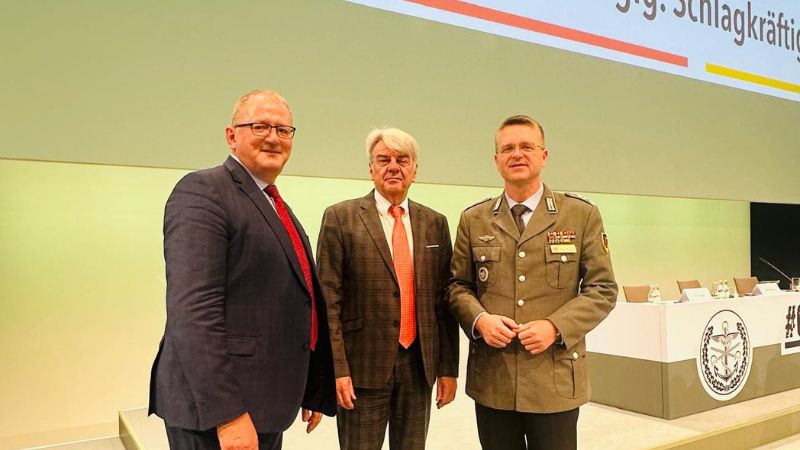

Romain Wolff at the DBwV General Assembly
At the re-election of André Wüstner, the President of CESI highlighted the strong CESI–DBwV partnership and stressed that Europe must strengthen its defence capabilities without undermining social standards or the welfare state.
At the 2025 General Assembly of the German Armed Forces Association (Deutscher BundeswehrVerband DBwV) in Berlin, CESI President Romain Wolff underlined the strong European partnership between CESI and the DBwV and the vital role of soldiers as “citizens in uniform.”
Romain Wolff thanked the Association for more than a decade of close cooperation, which has grown from an observer status in 2013 into a trusted and active partnership. He reaffirmed that soldiers are a core part of the public service and deserve fair conditions, respect, and adequate remuneration across Europe.
In view of the challenging geopolitical environment—from Russia’s war against Ukraine to rising hybrid threats—Wolff stressed that Europe’s security ultimately depends not on technology alone, but on the men and women in uniform.
He praised the Assembly’s motto “Unabhängig – Schlagkräftig – Zuverlässig” as a reflection of the values shared by both CESI and the DBwV: independence, impact, and reliability. He also warmly extended congratulations to the re-elected President André Wüstner, wishing him continued strength and success.
Romain Wolff added that Europe is entering a phase in which a difficult balance must be struck. On one side stands the legitimate call for stronger defence capabilities and greater investment; on the other, the equally valid concern that such priorities could place pressure on education, healthcare, and social standards. He emphasized that this is precisely why the voices of CESI and the German Armed Forces Association are essential. According to him, it is vital to ensure that enhanced security never comes at the cost of a robust and equitable welfare state. Defence and social justice, he highlighted, must go hand in hand if the defence union is to remain a project rooted in the interests of EU citizens.
Looking ahead, Wolff called for a balanced approach in Europe: strengthening defence must not come at the expense of social standards. Security and social justice must remain aligned.
He concluded with a call for unity in defending shared European values and congratulated the DBwV on its 2025 Assembly and on 70 years of the Bundeswehr.
.jpeg)
At the re-election of André Wüstner, the President of CESI highlighted the strong CESI–DBwV partnership and stressed that Europe must strengthen its defence capabilities without undermining social standards or the welfare state.
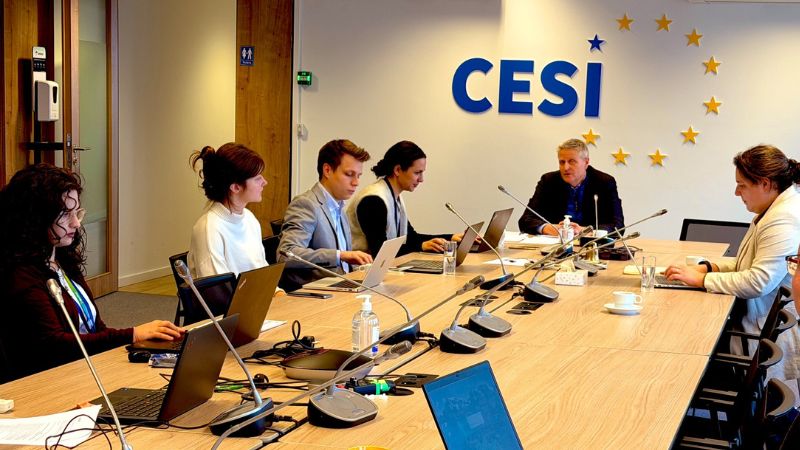

CESI@noon: Tackling health care workforce crises
Yesterday, CESI held a CESI@noon debate on the European Parliament's forthcoming own-initaitive report on an EU health workforce crisis plan.
Members and partners of CESI as well as institutional representatives discussed how to shape the final report of the European Parliament, which is expected to be adopted in March 2026, and how the European Pillar of Social Rights can be used to tackle staff shortages in the health care sector: CESI’s co-funded capacity building project 'PillAct' on the Eruopean Pillar of Social Rights has shown that understaffing, overload, gender inequality, poor infrastructure, and brain drain all undermine workers’ rights and care quality.
Speakers shared evidence and national experiences:
Jorge Cabrita, Research Manager of Eurofound, presented early results from the 2024 European Working Conditions Survey, showing how healthcare jobs have become more stressful and less attractive since the pandemic. Improving job quality is essential to keep current staff and attract new ones, he stressed.
Gorica Djokic, President of the Serbian Trade Union of Doctors and Pharmacists and CESI Vice-President of CESI's Expert Commission ‘Health Services’, reported about serious shortages in her country - around 4,000 nurses and 1,000 specialist doctors. Efforts to bring workers back and improve conditions exist, she said, but noted that problems continue due to low pay, weak social dialogue and high emigration. She also criticised new night-shift rules, introduced without union consultation.
Joséfine Declaye, Senior Policy Officer at the European Specialists Nurses Organisation (ESNO), highlighted that many patients face financial hardship, creating moral stress for nurses. She stressed how mentorship and stronger education pathways can improve staff recruitment and retention.
Paul De Raeve, Secretary General of the European Federation of Nurses Associations (EFN), underlined his organisation's strong support for the draft report of the European Parliament. He argued that keeping workers is as important as hiring new ones. He referred to evidence which shows that nurse-to-patient ratios improve outcomes for patients in terms of lower mortality, fewer readmissions, shorter stays and better infection control. Safe staffing also saves money by preventing complications and protects nurses from burnout, violence, and legal risk, he emphasised. He called for EU support through an occupational safety and health directive that would require each Member State to set and report on its own staffing standards via social dialogue.
Paloma Repila, President of CESI’s Expert Commission ‘Health Services’, presented CESI’s advocacy on the draft report. She outlined CESI’s position on staff shortages in the health care sector and CESI's aim to ensure that its proposals for amendments are incorporated into the report. The lobby work on the report will continue after meetings with several shadow rapporteurs, she said.
Hendrik Meerkamp, Senior Policy Officer at CESI, explained how the European Pillar of Social Rights, the European Semester process and other EU instruments could help address shortages and improve working conditions. While the Pillar provides a strong normative basis for quality health care and decent work, it is not legally binding, he said, while the European Semester, offers a soft governance tool through country reports and the social scoreboard, enabling trade unions and civil society to advocate for change. He mentioned that the EU is increasingly linking EU funding to progress on country-specific recommendations - a trend that should be strengthened, especially in the health care sector.
Closing the meeting, CESI Secretary General Klaus Heeger, emphasised: "Addressing health shortages across Europe is one of the fundamental discussions we need for the sustainability and resilience of our societies. Ethical recruitment, safe staffing levels, improved working conditions and flexible working arrangements are the only way forward. Investments must be made at the right levels to ensure high care standards and equal working conditions for everyone in the EU."
Yesterday, CESI held a CESI@noon debate on the European Parliament's forthcoming own-initaitive report on an EU health workforce crisis plan.
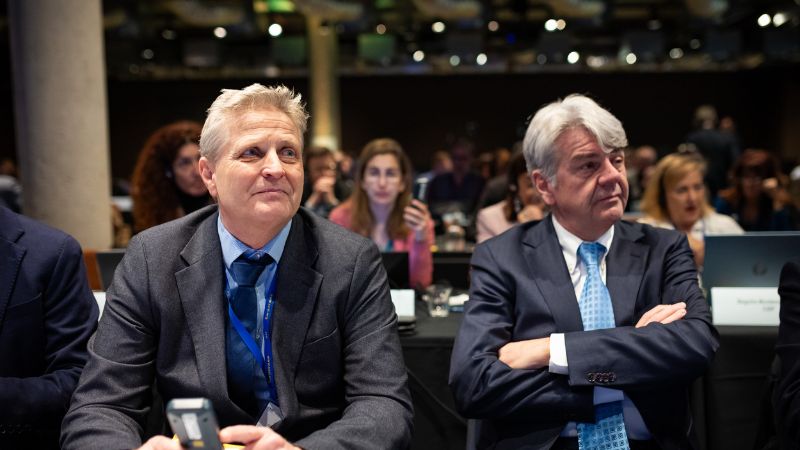

A turning point: Why the CJEU’s minimum wages ruling matters
By upholding the Minimum Wages Directive, the CJEU has set a clear signal: fair wages and strong collective bargaining are central to Europe’s social future. The judgment empowers governments to lift wage floors and tackle in-work poverty with renewed confidence.
In its landmark judgment delivered on 11 November 2025, the Court of Justice of the European Union confirmed the legality of the EU Directive on Adequate Minimum Wages—an outcome that carries substantial weight for Europe’s wage-setting landscape. The ruling reaffirms that the EU can set a framework to ensure that statutory minimum wages allow workers to maintain a decent standard of living and that collective bargaining systems across the Union are reinforced and expanded.
Although the Court invalidated Article 5(2), which had introduced a detailed set of EU-level criteria for evaluating the adequacy of minimum wages, this adjustment leaves the broader architecture of the Directive untouched. The essential obligation for Member States to ensure minimum wages meet the threshold of adequacy remains firmly anchored in Article 5(1).
Likewise, Article 5(4) continues to provide Member States with important benchmark indicators—namely, the 60% of median wage and 50% of average wage reference points—to guide national reviews and adjustments. Crucially, all the provisions aimed at cultivating stronger collective bargaining remain in effect, including the requirement for countries with low bargaining coverage to prepare national action plans. The Directive’s non-regression clause, which prevents Member States from weakening their wage-setting systems, also remains fully applicable.
Main elements of the Court’s judgment:
- The Court confirmed the EU’s authority to set a framework for adequate minimum wages.
It held that EU action on working conditions may legitimately influence wage levels, as long as it does not directly determine pay. This interpretation preserves space for meaningful EU initiatives to combat low pay and wage inequality.
- Only two provisions were annulled for overstepping EU competences.
The Court struck down Article 5(2), which imposed detailed EU-level criteria for assessing wage adequacy, and Article 5(3), which prohibited the reduction of minimum wages when automatic indexation mechanisms are in place. These were considered too intrusive into national wage-setting autonomy.
- The core adequacy framework remains intact.
Article 5(1) continues to anchor minimum wages in the requirement of a decent standard of living, and Article 5(4) retains the key reference values—around 60% of the gross median wage and 50% of the gross average wage—providing clear benchmarks for national updates.
- Collective bargaining provisions were fully upheld.
The Court confirmed the legality of measures requiring Member States with low collective bargaining coverage to prepare National Action Plans and to actively strengthen bargaining structures. These are not seen as interference with the right of association.
- The non-regression clause remains unaffected.
Member States remain bound not to weaken existing protective elements of their wage-setting systems, ensuring the Directive drives progress rather than regression.
- The Court clarified the distinction between the right of association and the right to collective bargaining.
It underlined that Article 153(5) TFEU excludes EU competence only in relation to association—the freedom to create, join, or not join organisations—not collective bargaining itself. Therefore, measures regulating or promoting collective bargaining remain within EU competence.
- The legal basis of the Directive was confirmed.
The Court rejected arguments that unanimity was required for adoption, affirming that the Directive was validly adopted by qualified majority within the scope of EU powers on working conditions.
The political message of the ruling is equally significant. As CESI Secretary General Klaus Heeger stressed at the time of the judgment, the Court has made it clear that the European Union retains the authority to act decisively in favour of fair pay. With the Directive upheld, national governments now have full legal clarity to raise statutory minimum wages and invest in robust collective bargaining structures.
The expectation is that Member States will use this certainty to push wage floors upwards—towards what can genuinely be considered a decent standard of living—and to reinforce workers’ negotiating power through stronger, more inclusive collective bargaining frameworks.
Looking ahead, governments are urged to move quickly: to translate the Directive into concrete reforms, strengthen collective bargaining coverage and institutions, and set minimum wages at levels that correspond to real living costs. Aligning national measures with international norms will be essential for creating durable, rights-based wage-setting systems.
CESI has reiterated its readiness to support these processes through social-partner dialogue and legislative follow-up, with the overarching aim of securing fair, adequate wages for all workers across Europe.
By upholding the Minimum Wages Directive, the CJEU has set a clear signal: fair wages and strong collective bargaining are central to Europe’s social future. The judgment empowers governments to lift wage floors and tackle in-work poverty with renewed confidence.


EU Equal Pay Day 2025: A long way to go
On Equal Pay Day 2025, CESI recalls that the gender pay gap in the EU still stands at an unacceptable 12%.
In 2025, women in the European Union still earn significantly less than men – around 12 percent per hour. This pay gap corresponds to roughly six and a half weeks of work per year for which women, in statistical terms, are not paid. This is why 17 November marks the European Equal Pay Day – the day from which women symbolically ‘work for free’ until the end of the year, while their male colleagues continue to be paid.
At CESI, this day is a stark reminder. It shows that equality in the labour market is still far from reality – despite decades of political commitments, despite increasing female labour market participation, despite rising qualification levels. Pay inequality is not an individual issue; it is a structural one. It arises where female-dominated professions are systematically undervalued and underpaid. It arises when career paths are obstructed by poor work-life balance, and when there is too little transparency about how wages are determined.
With the EU Pay Transparency Directive, we now have a powerful tool to make these inequalities visible – and to eliminate them. But legislation only has an impact when it is implemented effectively. We count on governments, employers and social partners across all Member States to act swiftly and ambitiously.
On this Equal Pay Day 2025, CESI reiterates: Equal pay for equal and equivalent work must not remain a promise for the future. It must become reality – for every woman in Europe, regardless of sector, background or life situation. Fair pay is not only a matter of justice; it is also a matter of economic rationality and a sign of respect for the millions of women whose daily work sustains our societies. It is time to act.
On Equal Pay Day 2025, CESI recalls that the gender pay gap in the EU still stands at an unacceptable 12%.


Towards equal opportunities in defence employment
On 4 November 2025, CESI’s Security and Defence Commission and the eQualPro conference brought together experts in Berlin to discuss how to strengthen gender equality in Europe’s armed forces.
On 4th of November 2025, CESI’s expert commission ‘Security and Defence’ and the eQualPro EU-co-funded conference gathered experts, policymakers, and representatives of the armed forces in Berlin and online to address a vital question: How can gender equality be strengthened in Europe’s military and defence systems?
The day began with a session of the CESI Expert Commission on Security and Defence, chaired by Sebastian Käding (DBwV, Germany), and opened by Klaus Heeger, CESI Secretary General. The discussions focused on national developments in security and defence policy, with interventions from Vice-Presidents of the CESI expert commission: Imke von Bornstaedt Kuepper (VBB-Bund, Germany) and Walter Hirsch (Eurofedop, Austria). Dirk Berger, European Parliament representative presented the EU’s latest defence priorities under the new EU Readiness Plan.
The afternoon eQualPro conference marked 25 years since the landmark European Court of Justice (ECJ) ruling in the case of Tanja Kreil, which opened the way for women to serve in combat roles in the German armed forces.
Marcel Bohnert, retired lieutenant colonel and Deputy Federal Chairman of the German Armed Forces Association (DBwV), reflected on this milestone and the progress achieved since. The ECJ held in its 2000 ‘Tanja Kreil’ ruling that Germany’s blanket exclusion of women from armed roles breached EU equal-treatment law, catalysing full access for women to all Bundeswehr career tracks from 2001 on. Today women serve ‘on equal footing’ in command and combat roles, with very few exceptions.
Further contributions explored how equality and diversity are evolving in defence structures:
• Dominicus Gnielinski (BMVg P II 6, Germany) revisited the impact of the Tanja Kreil ruling as a starting point for wider change in the armed forces and public administration.
• Claudia Schalling (ZinFü, Bundeswehr Leadership and Civic Education Center) shared insights on diversity and inclusion from within the Bundeswehr.
• Marion Böker, Director of the Human Rights and Gender Advisory Service, analysed the overall impact of EU legislation and case-law on gender equality in Germany - and the remaining loopholes.
Klaus Heeger, Secretary General of CESI, concluded: “Gender equality in the armed forces is a question of representation of half of the society. It is a test for our commitment to democracy, inclusion, and human rights. And it is about resilience and readiness for the challenges of tomorrow. The reintroduction of conscription in several EU Member States as well as the EU’s growing emphasis on strategic preparedness require a firm integration of gender equality principles. A successful EU preparedness strategy depends on women’s full participation and non-discrimination.”
Sebastian Käding, member of the German Armed Forces Association (DBwV) and President of CESI’s expert commission ‘Security and Defence’, commented: “As Member States revisit conscription and scale up total defence, equal treatment is not optional: it is integral to recruiting, retaining and promoting talent across the armed forces. The EU gender equality acquis is fully applicable to defence—no carve-outs.”
As repeatedly emphasized during CESI’s European Defence Round-Tables (EDRT), soldiers are citizens in uniform - and their social rights should be protected accordingly.
On 4 November 2025, CESI’s Security and Defence Commission and the eQualPro conference brought together experts in Berlin to discuss how to strengthen gender equality in Europe’s armed forces.


Activer project closes with position on trade union priorities on active labour market policies
CESI's Activer project closed with the adoption of a new position paper on trade union priorities for successful active labour market policies.
In the position paper, which synthesises findings from CESI's Activer project and deducts trade union demands from them for effective and inclusive active labour market policies (ALMPs) in Europe, CESI calls to improve ALMPs in Europe in cooperation with trade unions and social partners by through improved job guidance and job matching by employment services, up-/re-skilling and training, employment and hiring incentives and direct job creation.
CESI Secretary General Klaus Heeger said: "Well-designed active labour market policies can be practical engines for fair transitions: they shorten unemployment spells, prevent skills obsolescence, and lift job quality. Crucially, ALMPs deliver best when workers and their representatives co-design, co-govern, and co-monitor them."
The full position is available here.
CESI's Activer project closed with the adoption of a new position paper on trade union priorities for successful active labour market policies.


New position on AI at work
At its last meeting of the year, CESI's Presidium yesterday adopted a new position on AI at work.
In the position, CESI stresses that AI at work requires careful regulation to ensure that it remains human-centred, transparent, fair and safe, and that workers and their representatives are involved in the introduction and deployment of new AI tools at work throughout its lifecycle.
CESI further underlines that existing EU rules – the EU’s AI Act, General Data Protection Regulation (GDPR), occupational health and safety (OSH) legislation, and information & consultation frameworks –are necessary but not sufficient to govern algorithmic management across all sectors.
CESI Secretary General Klaus Heeger said: "A dedicated EU directive on AI at work is needed to close gaps, prevent pervasive surveillance and guarantee rights to information, consultation, training, redress and human review in AI for all workers.The directive should broaden key algorithmic safeguards of the EU Platform Work Directive to all workers, operationalise the GDPR’s Article 88 at work, complement the AI Act’s product safety logic with workplace rights and procedures, and align enforcement through labour inspectorates, data protection authorities and the European AI Office."
To this end, CESI proposes six pillars to frame AI management and regulation in a sustainable way together with workers: (1) social dialogue & participation; (2) ex-ante and ongoing impact/risk assessments; (3) transparency & explainability of algorithms with meaningful human review; (4) data governance & privacy-by-design; (5) training in AI literacy; and (6) health, safety & psychosocial risk prevention.
The full position, as adopted by the Presidium, is available here.
At its last meeting of the year, CESI's Presidium yesterday adopted a new position on AI at work.


Minimum Wages Directive stands: A clear mandate for fair pay
Brussels, 11 November 2025 — CESI welcomes today’s Grand Chamber judgment of the Court of Justice of the European Union confirming the validity of the EU Directive on Adequate Minimum Wages.
CESI welcomes today’s Grand Chamber judgment of the Court of Justice of the European Union confirming the validity of the EU Directive on Adequate Minimum Wages. The ruling secures the Directive’s core objective: ensuring that statutory minimum wages support a decent standard of living and that collective bargaining is promoted and strengthened across the Union.
The Court annulled Article 5(2), which listed detailed EU criteria for assessing adequacy, but it left the heart of the framework intact. Article 5(1) continues to link minimum wages to adequacy and a decent standard of living, and Article 5(4) retains the reference points around 60% of the gross median wage and 50% of the gross average wage to guide national updates. The provisions promoting collective bargaining were confirmed, including the requirement for Member States with low coverage to draw up national action plans. The Directive’s non‑regression clause also remains in place.
“Today’s ruling is a clear signal: Europe can and must act for fair wages. With the Directive confirmed, governments have full legal certainty to raise wage floors and expand collective bargaining. Now we expect swift, ambitious implementation that puts wages on a path to the threshold of decency and strengthens workers’ bargaining power,” said Klaus Heeger, CESI Secretary General.
CESI calls on governments to act now: implement the Directive in full, raise wage floors towards the threshold of decency, strengthen and extend collective bargaining through concrete measures, and ground decisions in international standards such as ILO Convention No. 131. CESI stands ready to support social‑partner consultations and legislative follow‑up to deliver fair, adequate wages across Europe.
Brussels, 11 November 2025 — CESI welcomes today’s Grand Chamber judgment of the Court of Justice of the European Union confirming the validity of the EU Directive on Adequate Minimum Wages.
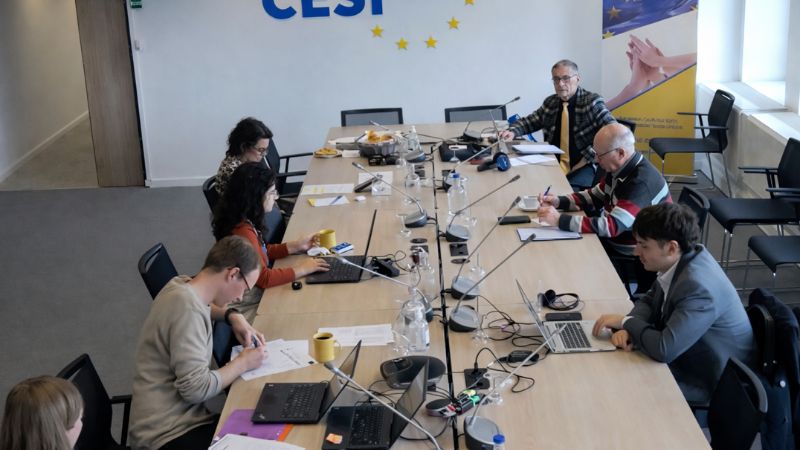

CESI Seniors hold constitutive meeting
On November 5, the newly established CESI Seniors held their constitutive meeting.
The meeting served to formally establish the CESI Seniors as a new platform in CESI dedicated to advocating for the needs and interests of the older generations and share best practices about improved conditions for the older generations in Europe.
Horst Günther Klitzing from the German Civil Service Federation 'dbb' was elected President.
CESI Secretary General Klaus Heeger said: "Although CESI has already had a successful cross-sectional group for younger generations, a similar representation for older people was still lacking. The CESI Seniors will fill this important gap and bring visibility to this group by CESI at the European level. It is also meatn to also encourage older employees and retirees to remain actively engaged insociety and public discourse."
At its constitutive meeting, the CESI Seniors jumstarted their work with policy exchanges with representatives from the European Commission on a new planned EU Action Plan on Intergenerational Fairness, the implementation of the EU Care Strategy, and the EU Pensions Adequacy Report 2024.
The next meeting of the CESI Seniors will take place in 2026.
On November 5, the newly established CESI Seniors held their constitutive meeting.
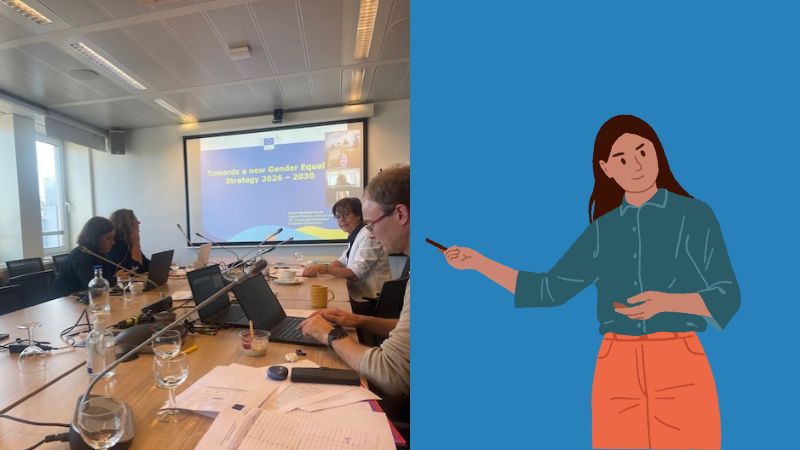

Employment and Women's Rights Commissions review EU gender equality and social policies
Yesterday, CESI's Commissions on Employment and Social Affairs and on Women's Rights and Gender Equality convened to review EU social and gender equality policies ahead of the new year 2026.
The meeting took place in the context of CESI's EU co-funded PillAct project, which seeks to to reinforce trade union action for a full implementation of the European Pillar of Social Rights at both EU and national levels.
Together with guests speakers from the European Commission's Directorate-Generals for Employment, Social Affairs and Inclusion and for Justice and Consumers, members of the Commissions assessed and reviewed priorities in advance of a new EU Gender Equality Strategy for 2026-2030, novelties introduced by the revised European Works Councils (EWCs) Direcitve, foreseesn simplication rules under the so-called Omnibus I on sustainability reporting for companies, and the broader work priorities of the European Commission for 2026.
The Commissions gave a mandate to the General Secretariat to draft guidelines for a better implementation of the European Pillar of Social Rights in the field of gender equality.
The next meeting of the Comissions on Employment and Social Affairs and on Women's Rights and Gender Equalitfy will take place in the first half of 2025.
Yesterday, CESI's Commissions on Employment and Social Affairs and on Women's Rights and Gender Equality convened to review EU social and gender equality policies ahead of the new year 2026.
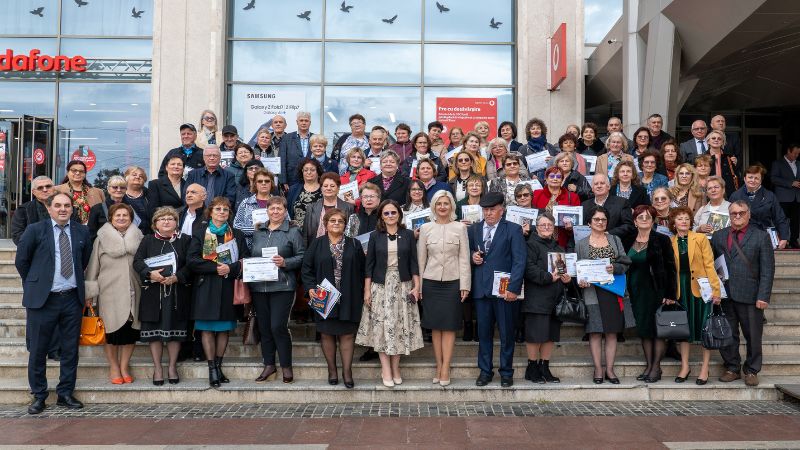

eQualPRO in Romania: Gender equality in the age of AI
CESI and USLIP Iași held a national eQualPRO conference in Iași on 24 October 2025, bringing together education stakeholders to discuss how AI affects gender equality and to explore solutions for fairer, more inclusive workplaces.
On 24 October 2025, CESI and its Romanian member organisation USLIP Iași hosted a national eQualPRO conference in Iași, bringing together education professionals, trade union representatives, academics and policymakers to explore how artificial intelligence is reshaping gender equality in the workplace.
Held under the title “L’égalité de genre à l’ère de l’intelligence artificielle – Défis et opportunités”, the event opened with contributions from USLIP Iași President Laviniu Adrian Lăcustă, leading local education authorities, and a video message from the European Parliament. A dedicated morning session also honoured retired USLIP teachers for their lifelong contribution to education.
In the afternoon, participants engaged with expert insights on the European framework for gender equality, the risks of AI-driven bias, and the opportunities new technologies offer to promote fairness in education. Speakers from the University “AL. I. Cuza” and the teaching profession highlighted how digital transformation can both challenge and enable equality if supported by strong policies and social-partner engagement. CESI Secretary General Klaus Heeger addressed the audience via video message, underlining how the eQualPRO project equips workers’ organisations to respond to emerging risks and ensure inclusive labour markets.
The conference concluded with reflections from national trade union leaders and short interviews on how eQualPRO continues to strengthen capacity-building and dialogue across Europe.
With its strong participation and forward-looking discussions, the Iași event marked an important national milestone in the project’s mission to support gender equality in a rapidly digitalising world.
CESI and USLIP Iași held a national eQualPRO conference in Iași on 24 October 2025, bringing together education stakeholders to discuss how AI affects gender equality and to explore solutions for fairer, more inclusive workplaces.


CESI at the SEISMEC General Assembly in Thessaloniki
CESI joined partners in Thessaloniki for the SEISMEC General Assembly to discuss progress on promoting human-centric, ethical, and socially sustainable innovation in industry.
On 21–22 October 2025, CESI took part in the SEISMEC General Assembly (GA) hosted by CERTH in Thessaloniki, Greece. The meeting brought together all project partners to take stock of progress, exchange insights, and plan the way forward for the next phase of SEISMEC.
The sessions covered updates from the project’s various pilot sites and discussions on how to strengthen human-centric approaches across industrial technologies. CESI contributed to the dialogue on the ethical, social, and economic dimensions of manufacturing innovation and how these can be better reflected in practice. The meeting also provided opportunities to connect with partners and share lessons learned.
About SEISMEC
SEISMEC is an EU-funded Horizon Europe project that aims to embed human-centric, ethical, and socially sustainable principles into industrial manufacturing. Its goal is to ensure that technological progress goes hand in hand with fairness, wellbeing, and accountability at work.
By developing tools, frameworks, and pilot demonstrations, SEISMEC helps companies and research partners understand and measure how their innovations affect people and communities.
As a partner in SEISMEC, CESI brings the voice of workers into the project. Through its expertise in social dialogue, labour rights, and policy development, CESI ensures that human-centric innovation remains grounded in real workplace realities and European social values.
At the Thessaloniki meeting, CESI reaffirmed its commitment to promoting a transition to ethical, inclusive, and worker-focused industrial transformation — one that balances technological progress with respect for people.
CESI joined partners in Thessaloniki for the SEISMEC General Assembly to discuss progress on promoting human-centric, ethical, and socially sustainable innovation in industry.
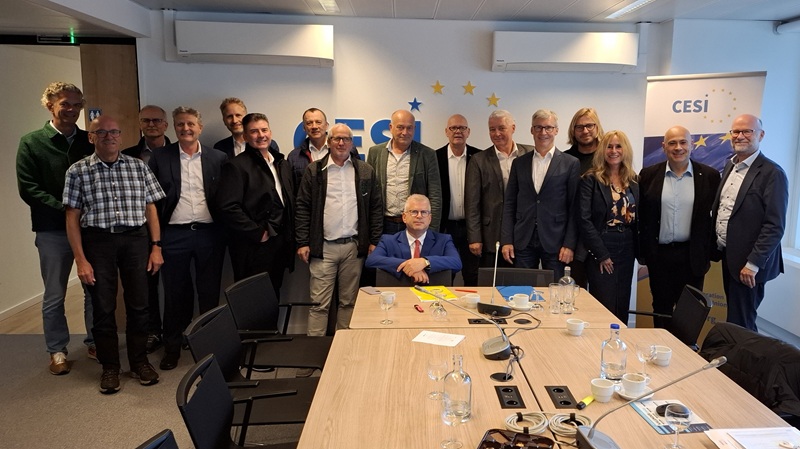

Expert Commission ‘Post and Telecoms’ sets positioning on new EU Delivery Act
At its annual meeting today in Brussels, CESI’s Expert Commission set its position an announced new EU Delivery Act which will replace or amend the current EU Postal Services Directive and Cross-Border Parcel Deliveries Regulation.
The meeting, which brought together representatives from sectoral member organisations from countries including Germany, France, the Netherlands, Luxembourg and Austria, saw the participation of guest speakers from the European Commission as well as of UNI Europa and PostEurop, which constitute together with CESI the EU’s social partners in the European sectoral social dialogue committee on postal services.
Speakers from the European Commission detailed out the timing, consultation procedure and scope of a new EU Delivery Act, which could bring substantial changes of employment and working conditions of postal staff across Europe too. After vivid discussions with Dimitris Theodorakis from UNI Europa and Nerea Perez Arcos from PostEurop, the Expert Commission set out to draft a position for CESI’s upcoming legislative advocacy work on the subject.
The discussion took place not least in the context of CESI’s new PillAct project, which serves to sensitive CESI’s members and affiliates to use the European Pillar of Social Rights as a tool to make a case for decent employment and working conditions across the EU.
As the constitutive meeting following CESI’s last Congress, the meeting also saw the election of Manfred Wiedner from Eurofedop/the Austrian GPF-FCG as President of CESI’s Expert Commission on Post and Telecoms, and of Christina Dahlhaus from the German dbb/DKVKOM and Samuel Goldberg from the Dutch CNV as Vice-Presidents. CESI Secretary General Klaus Heeger said: “I am glad to see this trio leading our Expert Commission on Post and Telecoms. Manfred Wiedner is a long-standing Austrian trade unionist and previous President of our Expert Commission, with a true sense for Europe and better employment and working conditions for post and telecoms staff across the EU. Christina Dahlhaus and Samuel Goldberg bring a wealth of additional expertise from the sector, with a proven track record of interest representation for telecoms and postal workers in Germany and the Netherlands respectively.”
At its annual meeting today in Brussels, CESI’s Expert Commission set its position an announced new EU Delivery Act which will replace or amend the current EU Postal Services Directive and Cross-Border Parcel Deliveries Regulation.


Digital sovereignty and people’s abilities
Editorial by Klaus Heeger, CESI Secretary General
Dear members, partners and friends,
The European Commission’s 2026 Work Programme, presented under the title “Europe’s Independence Moment,” wants to achieve digital sovereignty for Europe.
Several priorities are relevant to the world of work: the Quality Jobs Roadmap, the AI Act, skills mobility and an education package. Together, these initiatives aim not only to strengthen Europe’s capacity to innovate, but also to empower its people to thrive in a digital economy.
For those of us engaged in social dialogue, this moment carries both opportunity and responsibility. Technological independence will remain incomplete without the ability of workers and their representatives to understand, question, and co-shape the digital tools that increasingly mediate our professional lives.
Recent experiences have shown how this can be achieved in practice.
As a mentor in the Reshaping Work Fellowship, I had the privilege of engaging with young professionals examining AI’s ethical and economic implications. Their questions echoed those we hear in workplaces across Europe: How do we reconcile efficiency with fairness, data with dignity?
At the SEISMEC General Assembly in Thessaloniki, these debates took on a concrete form. In the frame of this ambitious Horizon project, researchers, companies, and social partners, including CESI, are jointly developing ways to evaluate AI tools through human-centric criteria — transparency, explainability, and participation. CESI’s role in this project is to ensure that the workers’ perspective is integrated into these metrics from the very beginning.
The same logic underpins the UNESCO–Oxford MOOC on AI in Government, an ambitious global initiative promoting competence, accountability, and inclusion in public-sector AI. The connection to Europe’s own agenda is clear: technology can only strengthen democracy when the people using it truly understand it.
The Commission’s new Work Programme rightly emphasises digital sovereignty - but sovereignty begins with literacy and trust.
AI will only enhance productivity and resilience if it is rooted in a culture of participation. Trade unions, employers, and public institutions all share a responsibility to ensure that no one becomes a bystander in this transformation.
Europe’s “Independence Moment” is therefore not only about technological capacity, but also about social capability - the skills, rights, and confidence that make progress both fair and sustainable.
With kindest regards,
Klaus Heeger
Editorial by Klaus Heeger, CESI Secretary General
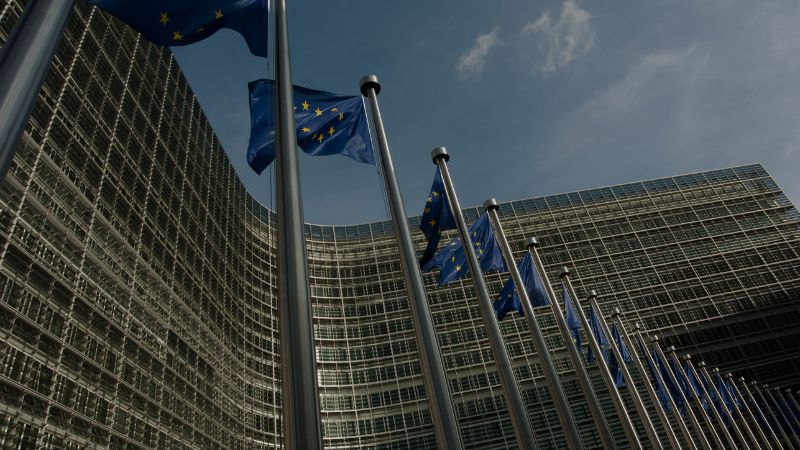

European Commission work programme for 2026: Time to focus on socially sustainable competitiveness
CESI welcomes several new initiatives that the European Commission has announced to drive forward in 2026, but misses at least one.
Above all, CESI is glad to see a proposal for a legislative Quality Jobs Act in the work programme for 2026, which could be a major step forward for workers in Europe. As demanded by CESI in a previous consultation on a Quality Jobs Roadmap, it is central that the Act will tackle precarious work and in-work poverty, help ensure fair wages and decent conditions in all sectors, strengthen social dialogue and collective bargaining, and guarantee real opportunities for skills development and lifelong learning for young persons and workers alike. Above all, it must enshrine the principle that quality work is the foundation of Europe’s competitiveness and resilience.
Moreover, a fair mobility package comprising measures to introduce a European Social Security Pass, to strengthen the European Labour Authority and to pursue a skills portability initiative can be important tools to help achieve a more efficient freedom of movement of workers in the Single Market and thereby mitigate regional skills shortages.
The announcement of a new Public Procurement Act to revise EU public procurement rules is highly encouraging. CESI, along with other unions, has for long demanded binding social requirements such as the application of a proper collective agreement for workers in any company that wants to benefit from EU funding. If done correctly, new public procurement rules for the EU could thereby be a considerable lever for significantly improved employment conditions of tens or thousands of workers across Europe. Unfortunately, the Commission Work Programme does not yet foresee a similar initiative in the field of State Aid, which also represent public financial assistance for private enterprises.
In the area of women’s rights and gender equality, a new Gender Equality Strategy 2026-2030 is foreseen, as expected. As outlined by CESI previously, it will be important tie the Strategy to concrete outcomes and relate them to the Roadmap for Women’s Rights from earlier this year too.
In the field of education, a new Basic Skills Support Scheme and new 2030 Roadmap on the future of digital education and skills could offer new opportunities for training and lifelong learning. Unfortunately, a new EU Teachers Agenda which was originally foreseen for 2026 is no longer part of the European Commission’s work programme for the next year.
A new EU Delivery Act to revise or at least amend the EU Postal Services Directive and Cross-Border Parcel Deliveries Regulation could, ideally, strengthen universal service obligations in the postal sector and also extent this to the emerging parcels market, and thereby help secure decent employment for postal and courier workers across the Union.
A new dedicated EU directive on artificial intelligence (AI) at work as demanded by CESI is, unfortunately, missing. A new announced Cloud and AI Development Act and Digital Fairness Act for consumer protection do not seem to extent to the regulation of AI which fosters rather than dismantles employment and working conditions.
CESI Secretary General Klaus Heeger said: “New initiatives relate to policy fields which require improvements for workers across Europe, which we welcome. However, the detail will be in the devil. It will be vital that policies are made compatible with socially responsible competitiveness, not merely economic competitiveness.”
CESI welcomes several new initiatives that the European Commission has announced to drive forward in 2026, but misses at least one.
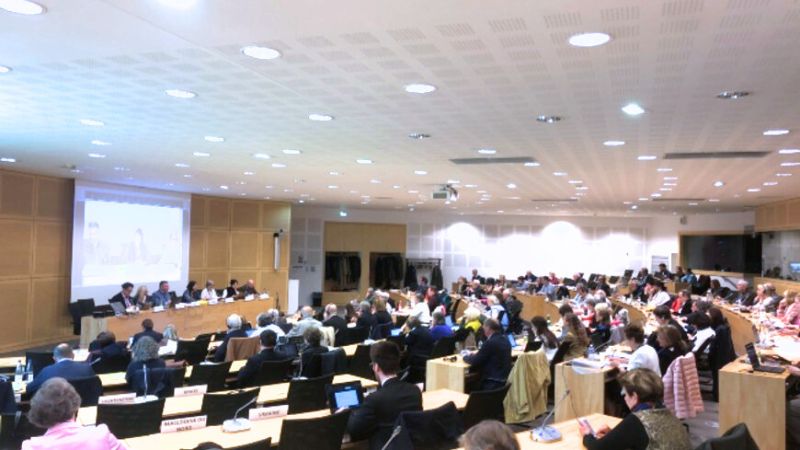

CESI in line with the priorities of the Council of Europe Conference of International NGOs
This week, from October 13-16, the Council of Europe (COE) held its latest annual session of the ‘Conference of International Non-Governmental Organisations’ in Strasbourg, aimed at giving space to democratic values, civic participation and social rights across Europe.
From the Standing Committee meetings on Monday to the General Assembly sessions later during the week, the event reaffirmed the essential role of civil society and trade unions as pillars of democratic life and social cohesion.
A special event on ‘Climate Justice and Civil Society’ in the context of the session focused on the intersection of environmental sustainability and social justice, aligning with CESI’s activities like its recent SYNCRISIS and ACTIVER capacity building projects for trade unions to ensure that the move to a green economy goes hand-in-hand with social fairness.
Discussions at the Conference also highlighted the increasing pressure on civil society organisations across Europe. Participants raised concerns about funding restrictions, reduced democratic participation, and the impact these have on workers’ rights to organise and act collectively.
Delegates reaffirmed that civil society and trade unions play a vital role in upholding rights, promoting inclusion and ensuring that social and economic changes benefit everyone. They emphasised the need to manage digital and environmental transitions in ways that promote equity, solidarity and participation. The debates reflected a shared commitment to strengthening democratic culture and protecting the voices of those who represent communities, workers and vulnerable groups.
CESI has always underlined that a free and independent civic space is essential for meaningful social dialogue and for protecting the ability of citizens and workers to express themselves and influence decisions. Examples from several European countries showed how limiting civic freedoms weakens both democracy and social cohesion.
CESI Secretary General Klaus Heeger stressed the importance of collaboration: “As trade unions, we must make every effort to build bridges between ourselves, other NGOs, citizens and institutions. The Council of Europe’s work aligns with our goal to renew social dialogue and protect the autonomy of workers’ organisations. We are proud to support this mission.”
This week, from October 13-16, the Council of Europe (COE) held its latest annual session of the ‘Conference of International Non-Governmental Organisations’ in Strasbourg, aimed at giving space to democratic values, civic participation and social rights across Europe.


CESI@noon on affordable housing in the EU
A timely event on affordable housing in the EU – building a social Europe for all in line with the objectives of the European Pillar of Social Rights (EPSR).
📅 Venue & date: Brussels CESI office and online via Zoom, January 14th, 2026
🕛 Time: 10:30-12:30
Registration link: https://us02web.zoom.us/meeting/register/KlRtWT84RYa7K_Spc5YaHg
Language: EN
CESI@noon
on
Affordable housing in the EU – building a social Europe for all in line with the objectives of the European Pillar of Social Rights (EPSR)
Europe is facing a deepening housing affordability crisis. Between 2010 and 2024, rents increased by 24% and housing prices by 49%, while income growth has stagnated. Today, 1 in 10 Europeans is overburdened by housing costs—and for young people, particularly young women and single parents, finding a stable home is becoming an increasingly difficult challenge.
Join our next CESI@noon discussion to explore what Europe can and must do to ensure affordable, inclusive, and sustainable housing for all. It will bring together policymakers, social partners, and youth advocacy groups to debate the newly launched European Affordable Housing Plan, stronger social housing investments, and a European Housing Guarantee – ensuring no one in Europe spends more than 30% of their income on housing. It will focus in particular on:
-Housing as a fundamental social right, not just a market asset
-Tackling the youth housing crisis and barriers to independence
-Impacts of the housing gap on young women and single parents
-Sustainable and energy-efficient housing solutions within the EU Green Deal
-Combating housing touristification, vacant housing, and homelessness through coordinated EU action
Provisional agenda (speakers to be confirmed):
10:30 Welcome address & introduction
Antonello Pietrangeli, CESI Youth Representative, ANIEF, Italy
10:40 Housing challenges and pressures in Europe: Trends and causes
Hans Dubois, Eurofound
Annika Sparrer, Eurodiaconia
Emiliano Rocchetti, International Union of Tenants
Bogdan-Alexandru Chelariu, CEE Bankwatch Network
11:20 Delivering the European Pillar of Social Rights: Implications for the right to housing
Kadri Uustal, European Commission, Directorate-General for Regional and Urban Policy (DG REGIO)
NN, Member of the European Economic and Social Committee; Member of the Cabinet of the Mayor of Barcelona, Jaume Collboni Cuadrado (tbc)
Kenna Padraic, Council of Europe, University of Galway, Ireland (tbc)
11:40 The main priorities of the European Commission on housing
Tatiana Marquez Uriarte, European Commission, Directorate-General for Energy (DG ENER)
11:50 The European Parliament activity within the HOUS Committee and the main findings of the field visits
Alicia Homs, Member of the European Parliament, Member of the Special Committee on the Housing Crisis in the European Union
12:00 The way forward – Adoption of the CESI position and exchange with the speakers and audience
Antonello Pietrangeli, CESI Youth Representative, ANIEF, Italy
12:30 Light lunch
A timely event on affordable housing in the EU – building a social Europe for all in line with the objectives of the European Pillar of Social Rights (EPSR).


EU Defence Readiness Roadmap 2030 must be rolled out with the military & civilian personnel of the armed forces
Today, the European Commission published a new Defence Readiness Roadmap 2030, in an effort to secure Europe’s defence preparedness by the end of the decade. CESI argues that all defence policy initiatives must be prepared and implemented together with those that execute operations: the military & civilian personnel of the armed forces.
In its Defence Readiness Roadmap, the European Commission proposes large-scale increases in investments to close capability gaps and strengthened joint procurement by Member States in four flagship projects: A European Drone Defence Initiative, an Eastern Flank Watch, a European Air Shield and a European Space Shield.
For CESI, it has always been obvious that defence readiness needs to be built with those that execute operations: the civilian and military personnel of the armed forces. A Roadmap with a clear and enforceable protection for social budgets, training, working conditions and social partner participation for the personnel of the armed forces stands a far better chance of being both effective, practical and politically sustainable that a roadmap that is implemented top-down by policy makers.
Klaus Heeger, Secretary General of CESI, said: “It is long overdue for the EU to take decisive steps to strengthen its defence capabilities. But the social rights of both military and civilian personnel in the armed forces must not be overlooked. If we want competitiveness to drive innovation and strengthen defence, we must fully harness our greatest asset: the civil and military personnel of the armed forces.”
Sebastian Käding, member of the German Armed Forces Association (DBwV) and President of CESI’s statutory Expert Commission on Defence, added: “The proposed initiatives are an important step in the right direction. Yet their success in enhancing Europe’s strategic autonomy will depend on placing people at the centre of these efforts. The interests of the military and civilian personnel of the armed forces must be taken into account. The future effectiveness of a European Defence Union will rely on this human-centred approach.”
As emphasised repeatedly at CESI’s European Defence Round Tables (EDRT), the future of the EU defence requires a consultative, collaborative approach to defence policies and measures.
Today, the European Commission published a new Defence Readiness Roadmap 2030, in an effort to secure Europe’s defence preparedness by the end of the decade. CESI argues that all defence policy initiatives must be prepared and implemented together with those that execute operations: the military & civilian personnel of the armed forces.


EU postal services social dialogue seminar in Athens
On October 7 CESI took part in a European social dialogue project seminar in Athens, together with UNI Europa and PostEurop, on 'Skills and work environment in the digital postal transition'.
UNI Europa, CESI and PostEurop - the three European social partner organisations in the postal services sector - held the seminar as part of a larger project which will still run into 2026 with a further seminar in Paris and a final European conference in Brussels, coupled with a final report, to identify key skills needs in the digitalising and transforming European postal services sector over the next 10 years. More specifically, the project serves to:
- identify skills for different postal job functions that will be required over the coming decade.
- specify core competencies that will drive the transformation and adaptation of postal employment.
- enhance the understanding of measures and training pathways needed to effectively accompany this transition.
- analyse how targeted skills and competences can contribute to reducing or managing occupational health and safety risks.
- assess the extent to which these needs are addressed by existing training offers and determine the most effective solutions to strengthen postal operators’ ability to manage such risks.
While the seminar in Athens focussed on back-office operations, the next symposium in Paris will zoom in on postal items delivery.
On October 7 CESI took part in a European social dialogue project seminar in Athens, together with UNI Europa and PostEurop, on 'Skills and work environment in the digital postal transition'.


CESI@noon: Tackling EU health workforce shortages through the EPSR
A CESI@noon event, held in the frame of CESI’s PillACT project, exploring how the European Pillar of Social Rights can help address the EU’s growing healthcare workforce shortages.
CESI CONFERENCE ON ‘HEALTH WORKFORCE SHORTAGES AND THE EPSR’
DRAFT AGENDA
Venue & date: Brussels and online via Zoom, November 18, 2025
Registration link: https://us02web.zoom.us/meeting/register/4r1WXKoNR3-oUaxK2SjjUA
Simultaneous interpretation: EN–ES (tbc)
CESI@noon: From principles to practice: Tackling EU healthcare workforce shortages with the European Pillar of Social Rights
Europe faces a looming health workforce crisis, with shortages projected to hit 4.1 million by 2030. Understaffing threatens workers, patients, and the sustainability of public health systems.
This CESI@noon event will discuss the European Parliament’s own-initiative report calling for an EU health workforce crisis plan, and will explore how the pledges of European Pillar of Social Rights remain unfulfilled due to understaffing, work overload, gender inequalities, inadequate equipment and infrastructure, and not least brain drain.
The European Pillar of Social Rights’ Principle 16 on Health Care stipulates timely access to affordable, preventive, and curative healthcare of good quality, whereas Principle 10 underscores workers’ rights to a high level of health and safety and a working environment that supports their professional needs and continued participation in the labour market.
Addressing workforce shortages is therefore not only a societal necessity but also a matter of fundamental social rights for health care workers in the EU.
Provisional agenda (all speakers to be confirmed):
10:30 Welcome address & introduction
Klaus Heeger, Secretary General of CESI
10:40 Healthcare challenges and pressures in Europe: Trends and causes
Jorge Cabrita, Eurofound (tbc)
Gorica Djokic, President of the Serbian Trade Union of Doctors and Pharmacists and CESI Vice-President of CESI’s Expert Commission ‘Healthcare Services’
Milena Angelova, Member of the European Economic and Social Committee (tbc)
Joséfine Declaye, Policy Officer, European Specialist Nurses Organisation (ESNO)
11:00 Delivering the European Pillar of Social Rights: Implications for health care systems
NN, European Commission
11:10 The European Parliament report on ‘EU health workforce crisis plan: sustainability of healthcare systems and employment and working conditions in the healthcare sector’
Paul De Raeve, Secretary General at European Federation of Nurses Associations (EFN)
András Tivadar Kulja, Member of the European Parliament (Group of the European People's Party, Hungary) (tbc)
Paloma Repila, President of CESI’s Expert Commission ‘Healthcare Services’, (SATSE)
11:30 The way forward - Exchange with the speakers and audience
12:00 Light lunch
A CESI@noon event, held in the frame of CESI’s PillACT project, exploring how the European Pillar of Social Rights can help address the EU’s growing healthcare workforce shortages.
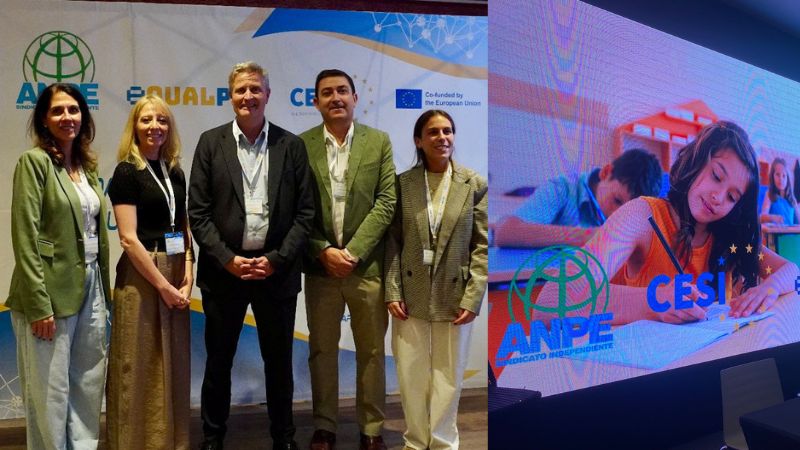

CESI and ANPE call for stronger implementation of European equality policies in education
In Barcelona, CESI and ANPE, through the EqualPro project, called for stronger implementation of European equality policies in education.
Barcelona, 8 October 2025 — CESI and ANPE, Spain’s main union for non-university teachers, jointly held a conference in Barcelona on European equality policies and their application in education. The event, organised within the framework of the EqualPro project, highlighted both the progress achieved in Spain thanks to EU strategies and the need for more consistent, well-resourced implementation.
Opening the conference, Klaus Heeger, CESI Secretary General, stressed the importance of assessing how European gender equality directives influence national policies. Ignasi Giménez, from the Catalan Department of Education, emphasised that “schools must guarantee equal opportunities” and that this “requires cultural transformation, not only laws.” Sonia García, ANPE National Vice President, and Joaquim Pintado, President of ANPE Catalonia, underlined the need for cooperation between European institutions and national education systems to make equality a practical reality.
Discussions showed that the EU Gender Equality Strategy 2020–2025 has been key to advancing gender mainstreaming in Spain’s public administration through equality plans and monitoring tools. However, implementation remains uneven, and challenges persist — notably the gender pay gap, the unequal sharing of care duties, and the lack of women in leadership roles, even in education.
Participants also examined the situation in schools, recognising progress under the LOMLOE, which integrates coeducation and diversity into curricula. Yet insufficient funding and teacher training hinder full implementation. Persistent vocational imbalances — such as women’s underrepresentation in STEM fields and the low number of male teachers in early childhood education — were also noted.
CESI and ANPE concluded that European equality policies and funds have driven meaningful progress but require greater consistency, resources, and evaluation. They called for equality to become a structural priority supported by stable financing, clear impact indicators, and active trade union participation.
Closing the event, Francisco Venzalá, ANPE National President, reaffirmed both organisations’ commitment: “Teachers are the engine of change, responsible for shaping a society based on equal opportunities, shared values, and social justice.”
In Barcelona, CESI and ANPE, through the EqualPro project, called for stronger implementation of European equality policies in education.


CESI welcomes European Parliament endorsement of a revised EWC Directive
CESI welcomes today’s vote of the European Parliament to approve a trilogue agreement with the Council on a revised European Works Councils (EWC) Directive.
For CESI, the vote is an important milestone in strengthening transnational information and consultation rights for workers across Europe, and calls on the Council to swiftly follow suite with a confirmation vote too, ensuring that the directive will be formally published as soon as possible.
The approved text includes several advances that reflect CESI’s long-standing priorities on the file:
• End of exemptions. Under the revised directive, companies that so far enjoyed a special exemption status based on old voluntary pre-1996 directive arrangements will in the future fall within the scope of the directive and be subject to the new, tighter rules.
• Sharper clarity on transnational matters. The compromise text in the revised directive now specifies that decisions or measures affecting employees across borders “in a substantial way” will trigger EWC information and consultation obligations.
• Limits on confidentiality restrictions. The text requires that non-disclosure or withholding of information by the company management may only be justified under objective criteria and only for as long as the reasons persist, thus curbing abusive uses of “confidentiality” issues by company managements to avoid genuine consultation.
• Strengthened access to justice and dissuasive sanctions. The agreement improves the right of workers’ representatives to judicial or administrative recourse, ensures cost coverage for legal representation of EWCs and mandates that penalties for non-compliance with rules by the management be effective, proportional and dissuasive.
• Better funding, material and logistical support. The revised text more clearly obliges company management to provide to EWCs adequate financial, material and legal resources including for meetings, travel and legal advice.
• Gender balance progression. The compromise strengthens aspirational goals and guidance toward more gender-balanced representation in EWCs.
CESI Secretary General Klaus Heeger said: “With today’s vote, the European Parliament has taken a decisive step toward building stronger, more credible instruments of worker involvement in transnational enterprises. This agreement – abolishing outdated exemptions, tightening consultation standards and reinforcing access to justice and resource support – promises to move EWCs from symbolic bodies more to structures capable of real influence.”
CESI welcomes today’s vote of the European Parliament to approve a trilogue agreement with the Council on a revised European Works Councils (EWC) Directive.


CESI calls for a right to disconnect and fair telework
On the occasion of a second phase social partner consultation, CESI calls on the European Commission to table legislation on a right to disconnect and fair telework.
In a position to the European Commission, CESI reiterates its call for clear and enforceable rules on the right to disconnect and fair telework, grounded in occupational safety and health, equality and respect for social partner autonomy.
On a right to disconnect, CESI stresses in particular that:
- a European right to disconnect would not only ensure fairness for workers but also create a level playing field for employers, ensuring that those who respect workers’ boundaries are not undercut by competitors demanding 24/7 availability.
- new measures on a right to disconnect must also consider social integration measures, ensuring that teleworkers are not cut off from workplace life or representation structures.
- rules must also explicitly address the dangers of excessive digital surveillance. Modern software and AI-driven tools can monitor online presence and communications in real time. Such practices can undermine trust, violate privacy and create a permanent climate of pressure.
On fair telework, CESI calls for EU rules that ensure schemes which are:
- voluntary and reversible: Workers must not be forced into telework and must be able to return to on-site work.
- equal in rights: Teleworkers must enjoy the same rights as office workers – equal pay, equal career opportunities, equal training, equal leave rights and equal protection against discrimination.
- safe and healthy: Employers must conduct risk assessments, ensure ergonomic standards and respect OSH obligations in remote contexts.
- preventing isolation: Telework must not lead to social exclusion. Employers should facilitate hybrid interaction, support access to trade unions and worker representatives and invest in digital tools that foster cooperation rather than isolation.
CESI Secretary General Klaus Heeger said: “Without clear rights and enforceable boundaries, flexibility risks becoming a trap of permanent connectedness. A binding right to disconnect would restore balance by guaranteeing that workers can fully enjoy their rest periods and family time. At the same time, While EU legislation must merely set a baseline. Social partners must retain autonomy to adapt implementation at sectoral and company level. This ensures solutions are tailored to specific industries and work cultures, while guaranteeing that no worker is left unprotected.”
CESI’s full position is available here.
On the occasion of a second phase social partner consultation, CESI calls on the European Commission to table legislation on a right to disconnect and fair telework.


Encouraging European Parliament vote to enter trilogues on a traineeships directive
This week, the European Parliament formally voted to enter into trilogue negotiations with the Council to adopt a new EU Traineeships Directive - a step to end abusive employment among young persons in Europe.
In contrast to the legislative proposal by the European Commission - and the Council's General Approach on it - the European Parliament's position argues in favour of written agreements for trainees which fix the "the pay, in accordance with national law, collective agreements or practice." A pay component reflects a key priority of CESI Youth.
CESI Youth is satisfied that, moreover, the European Parliament report explicitly asks for traineeships to entail written specifications on the duration and training objectives, access to social protection in accordance with national schemes, health and safety measures, and the inclusion of people with disabilities and structural disadvantages, as well as the recognition of periods designed to acquire skills in future retirement schemes.
The European Parliament underlined that unpaid internships often mean precarious, abusive practices with hampered access to social protection. Therefore, it wants all kinds of traineeships to be included within the scope of the directive, except those that are mandatory in education schemes to obtain academic credits.
While negotiations on a final wording of the directive are yet to start between European Parliament and the Council are still to come, the European Parliament's positioning is a strong signal in favour of a better protection of trainees.
CESI Youth will continue to advocate for quality and anti-abuse provisions for trainees in Europe.
This week, the European Parliament formally voted to enter into trilogue negotiations with the Council to adopt a new EU Traineeships Directive - a step to end abusive employment among young persons in Europe.
